Special Report
How Hurricane Idalia Compares to Last 25 Most Destructive Named Storms to Hit Gulf Coast
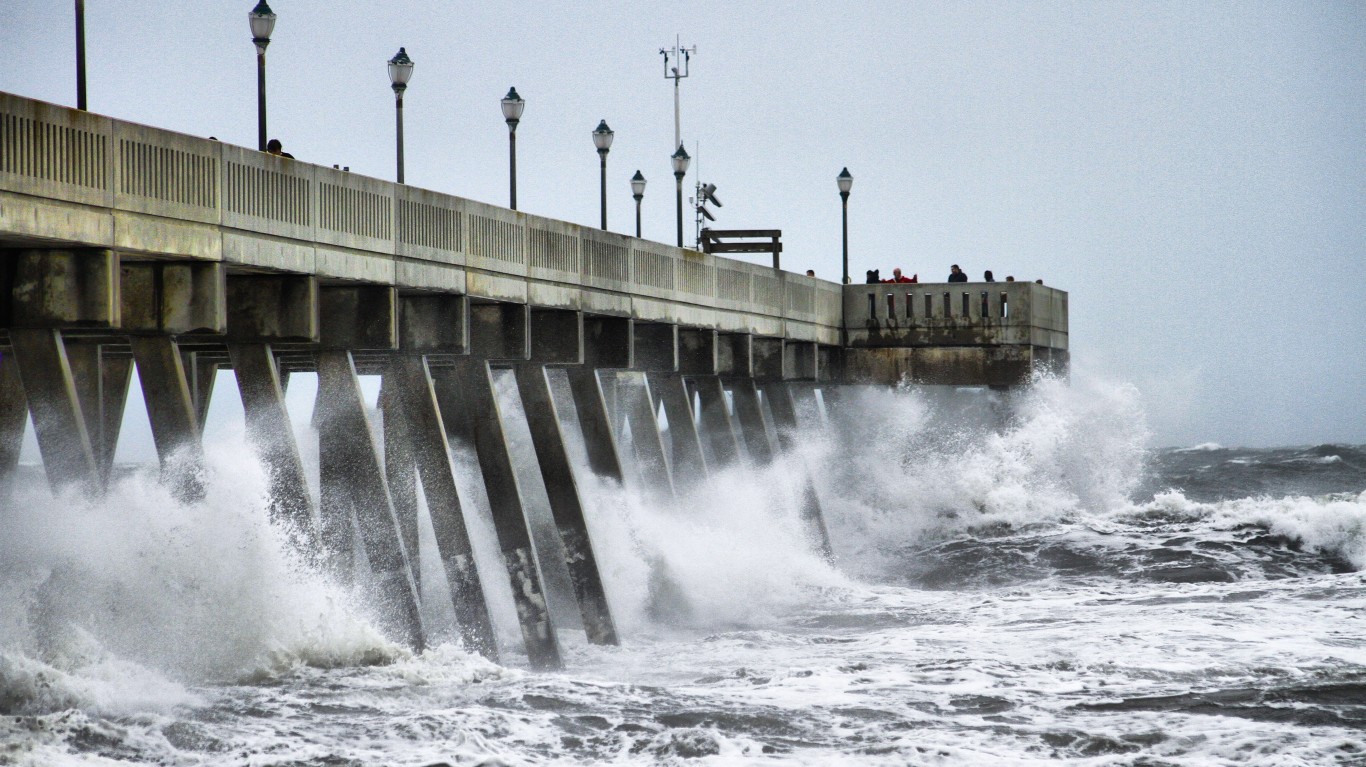
Published:

As Hurricane Idalia rocks Florida’s Gulf Coast with heavy rains and sustained winds over 100 mph, over a dozen counties are under mandatory evacuation orders. While Idalia briefly reached Category 4 status with winds over 131 mph, it hit land as a Category 3 storm and is the most powerful hurricane to make landfall in Florida’s Big Bend region in 125 years. (As of 2022, these are the worst hurricanes on record.)
The Gulf Coast is no stranger to hurricanes. To determine how Idalia compares to the last 32 most destructive storms to hit the region, 24/7 Wall St. consulted the National Weather Service’s Mobile/Pensacola forecast office to gather a list of major storms that impacted the Mobile/Pensacola County Warning Area from 2000 to present. The list is not exhaustive.
Four of the hurricanes to hit the Gulf Coast since 2000 have reached Category 5 status — the strongest tropical cyclones with winds reaching at least 157 mph. Some, however, including Hurricane Katrina that devastated New Orleans in 2005, had calmed to lower wind speeds before reaching land. Although Katrina had fallen from a Category 5 storm to Category 3 by the time it made landfall, it was nevertheless one of the most devastating hurricanes in U.S. history.
Other extremely costly hurricanes in the Gulf include Ian in 2022, Ida in 2021, Michael in 2018, and Irma in 2017. That some of the costliest hurricanes ever have occurred in the last decade is a sign that climate change is likely causing more intense cyclones. These are U.S. cities where hurricanes would cause the most damage.
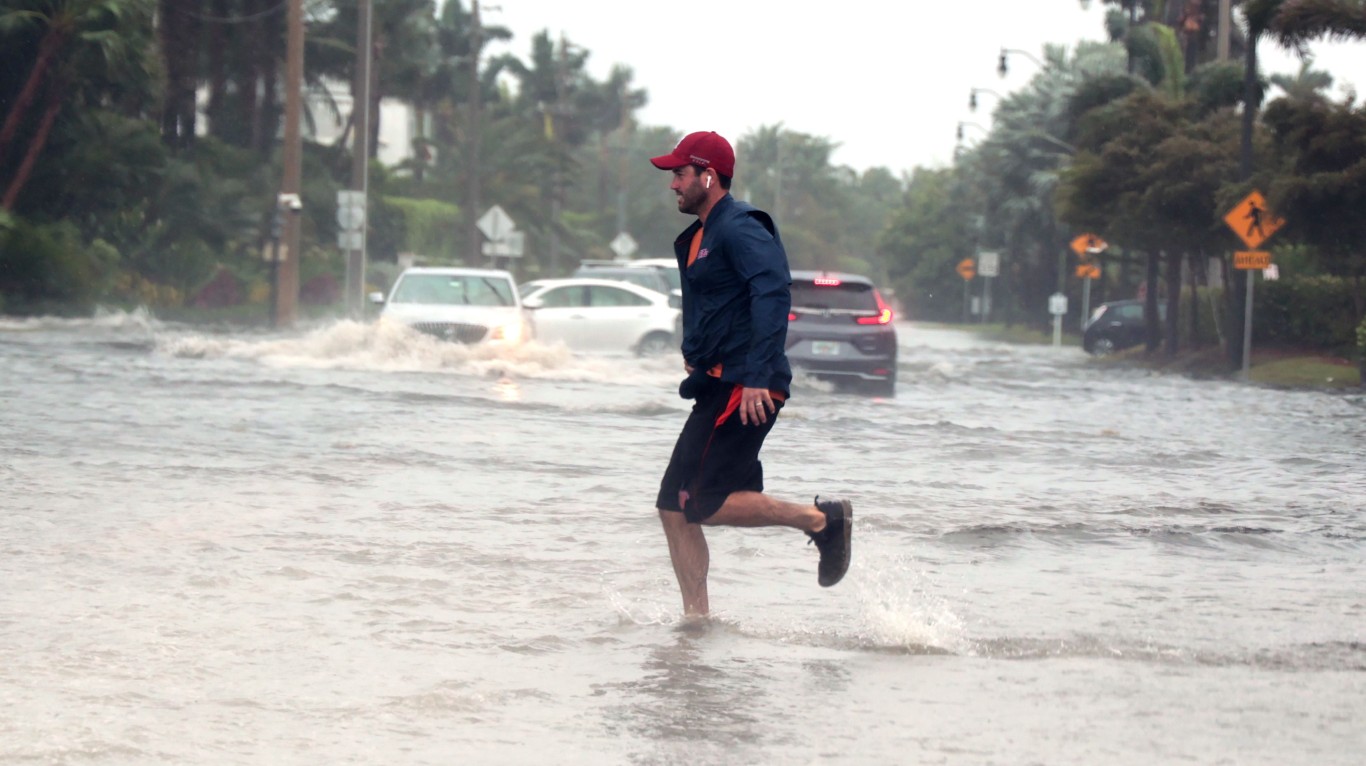
Hurricane Nicole
> Date: Nov 10, 2022
Hurricane Nicole, a rare November storm, caused significant damage across eastern and central Florida just six weeks after the area was hit by Hurricane Ian. Many coastal homes and condominiums were washed into the ocean.
[in-text-ad]
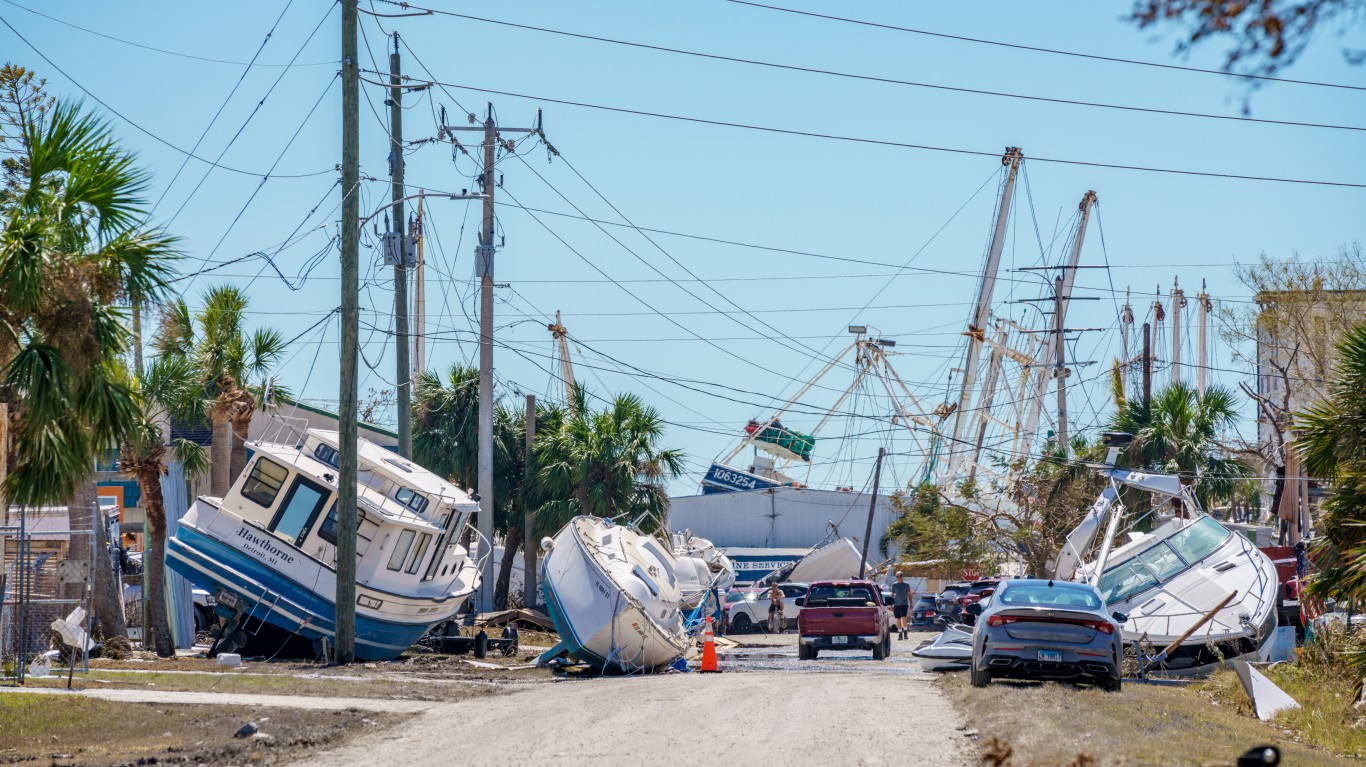
Hurricane Ian
> Date: Sep 28, 2022
Hurricane Ian reached Category 5, wreaking havoc on Florida’s coastal towns and causing 152 deaths. Fort Myers and Cape Coral were some of the hardest hit areas, with significant property damage and infrastructure disruption. The storm resulted in an estimated $113 billion in damages, making it the third costliest hurricane in the U.S. ever.
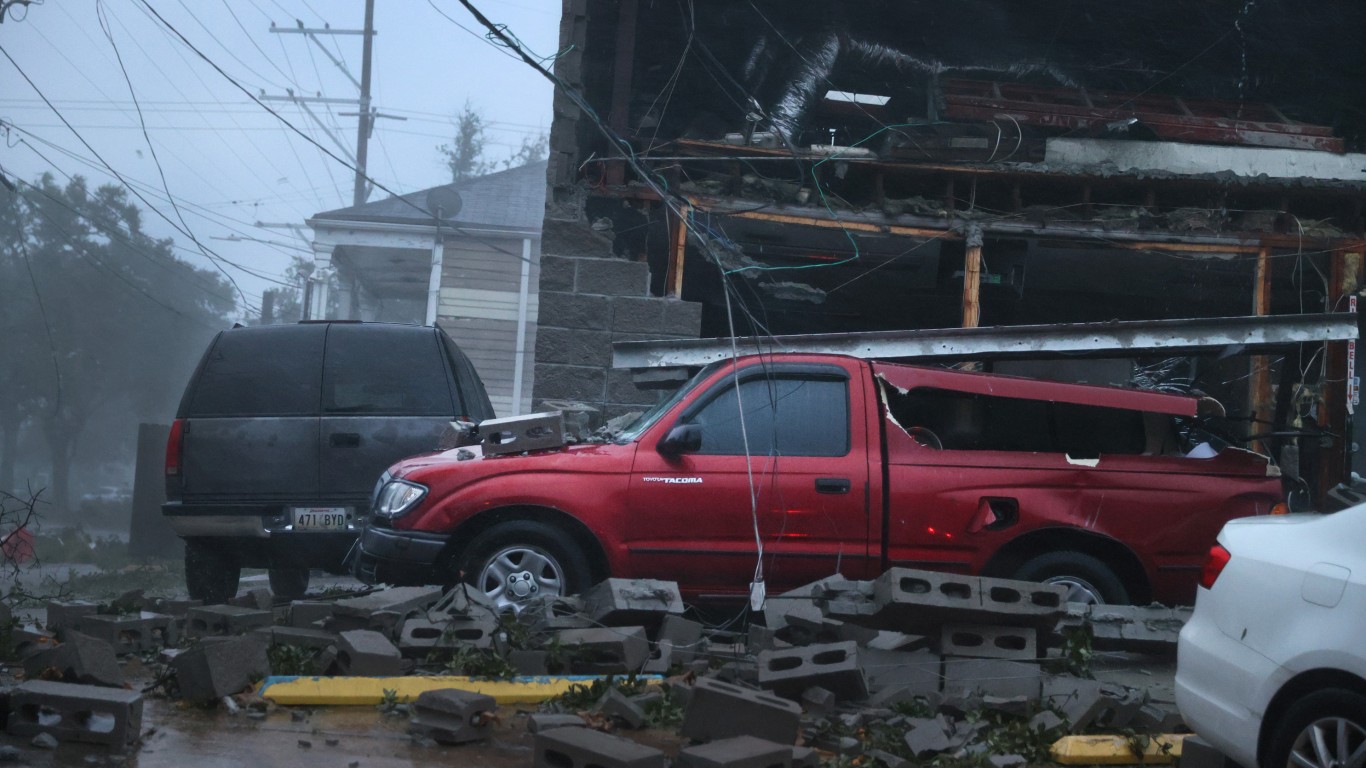
Hurricane Ida
> Date: Aug 29, 2021
Hurricane Ida, a Category 4 storm, was the deadliest and most destructive storm in 2021, causing significant damage and over 91 deaths across nine states. Hardest hit areas include the town of LaPlace in Louisiana, which experienced severe flooding, and Grand Isle, Louisiana, a barrier island that was decimated by the storm’s ferocity.
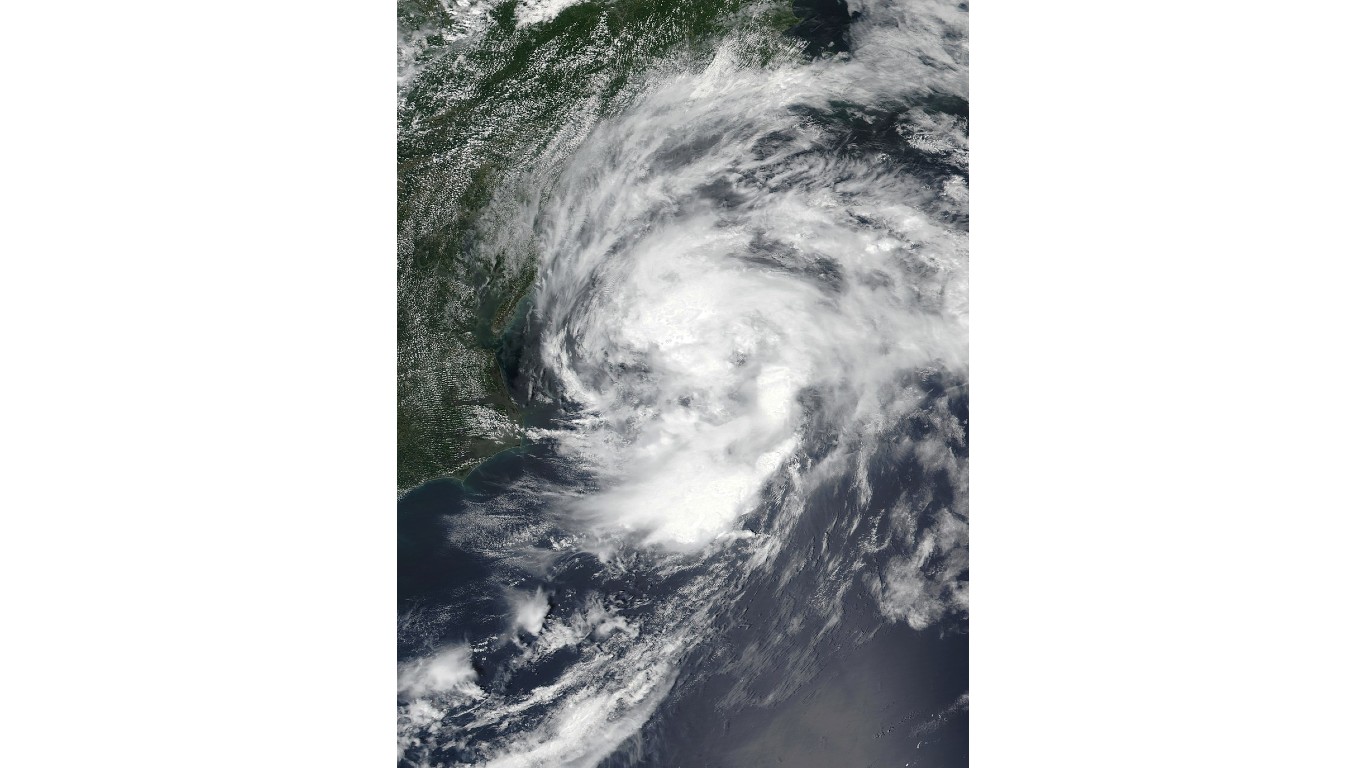
Tropical Storm Claudette
> Date: June 18, 2021
Tropical Storm Claudette caused significant damage in Alabama and Mississippi. The storm resulted in flash floods, tornadoes, and heavy rainfall, leading to property damage and loss of life, especially in the towns of Brewton and East Brewton, Alabama, where a tornado spawned by Claudette caused extensive destruction.
[in-text-ad-2]
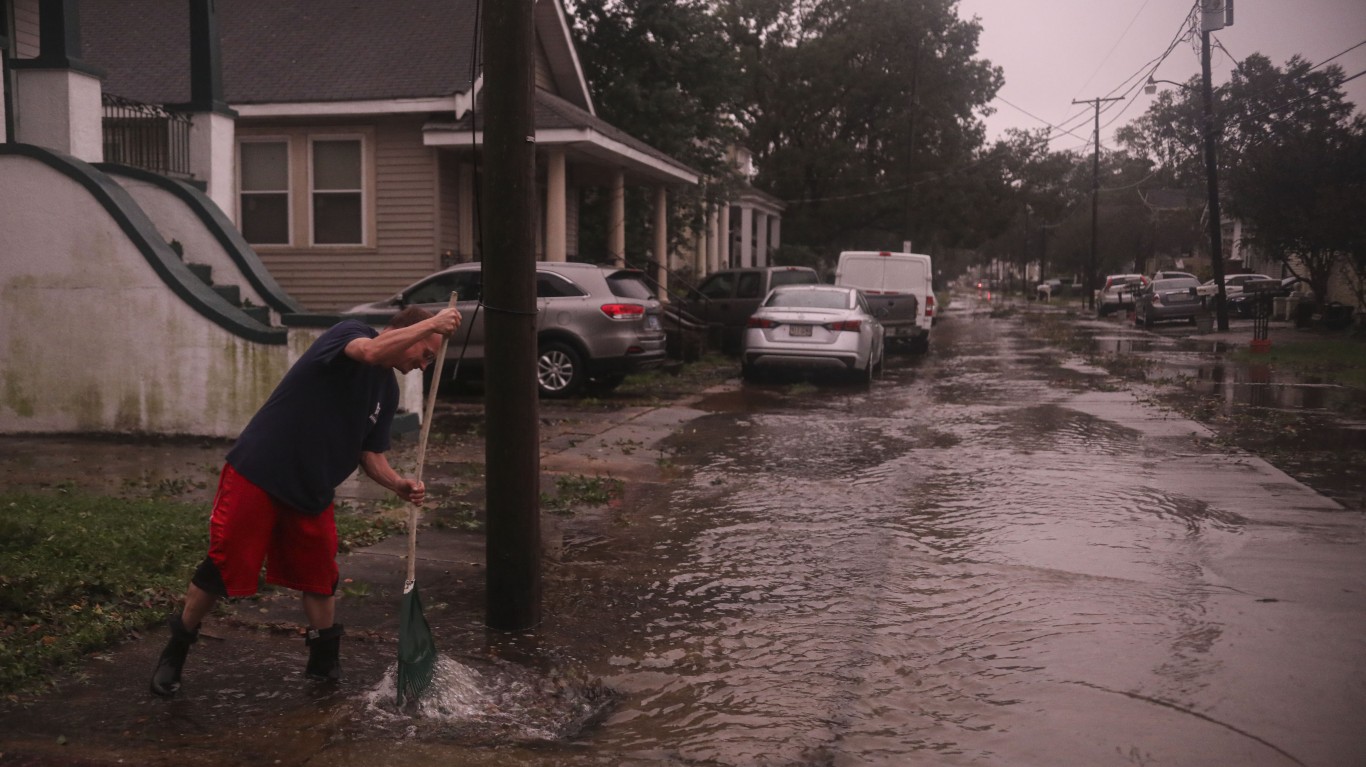
Hurricane Zeta
> Date: Oct 28, 2020
Hurricane Zeta, a Category 3 storm, caused an estimated $4.4 billion in damages in the United States. The hardest hit areas include New Orleans and Grand Isle, Louisiana, where Zeta caused widespread power outages and substantial property damage.

Hurricane Delta
> Date: Oct 9, 2020
Hurricane Delta reached Category 4 and caused significant damage in Louisiana. Lake Charles, Louisiana, already battered by Hurricane Laura a month prior, faced further devastation. The storm also impacted other coastal towns, causing widespread power outages and property damage.
[in-text-ad]
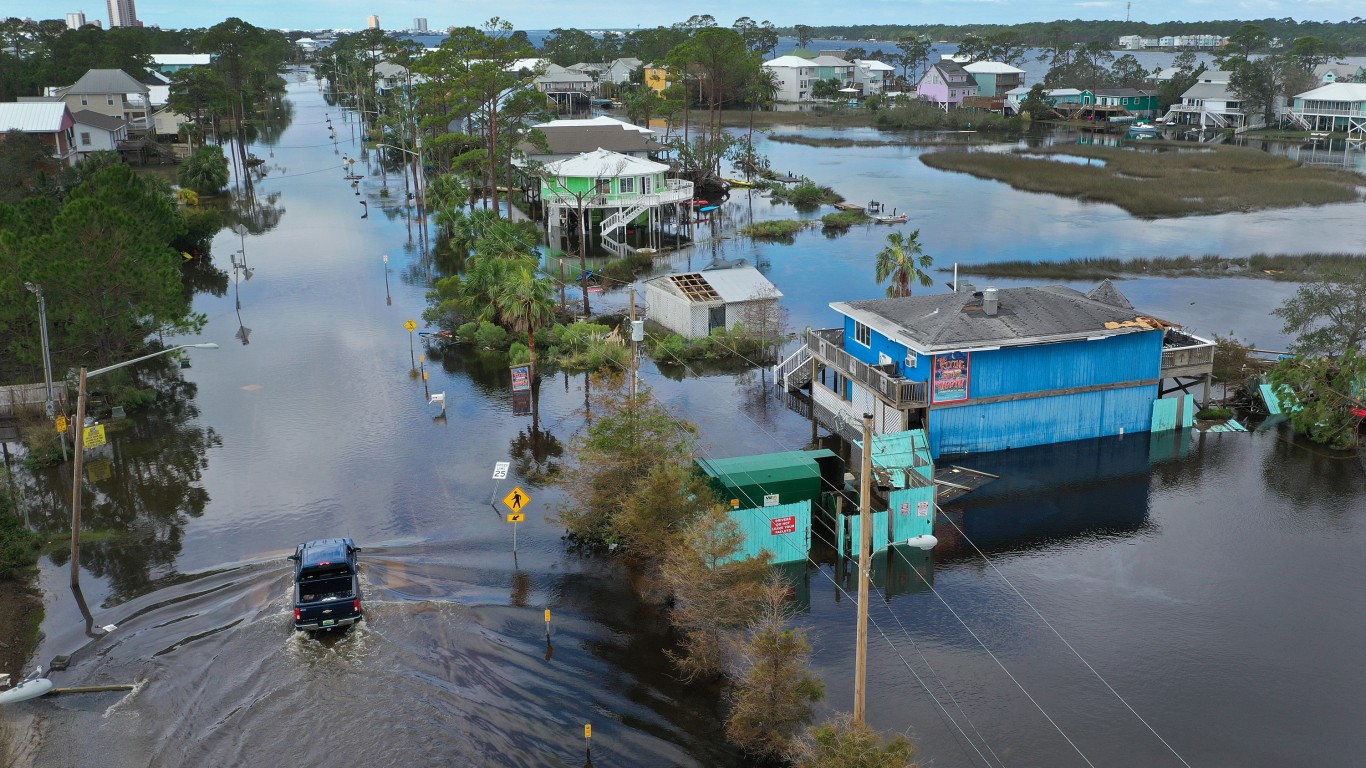
Hurricane Sally
> Date: Sep 15, 2020
Hurricane Sally made landfall in Gulf Shores, Alabama, and caused an estimated $7.3 billion in damage, mainly across Alabama and the Florida panhandle. The storm brought 30 inches of rain, which led to severe flooding and property damage in coastal towns including Pensacola, Florida, which experienced 100 mile per hour winds.
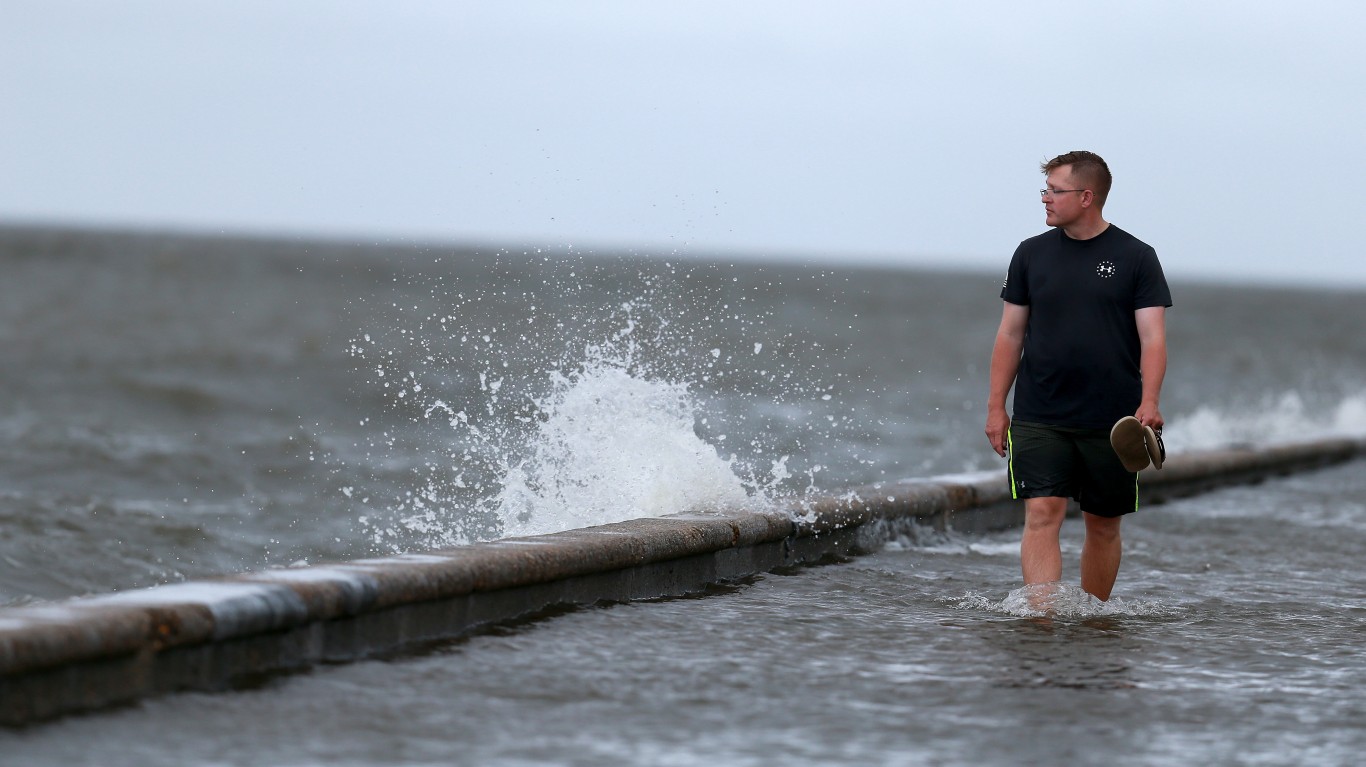
Tropical Storm Cristobal
> Date: June 7, 2020
Tropical Storm Cristobal caused flooding and storm surges from 3 to 6 feet high in coastal areas of Louisiana and Mississippi, leading to structural damage. High winds and tornadoes accompanied the storm, which also ravaged parts of the Midwest.
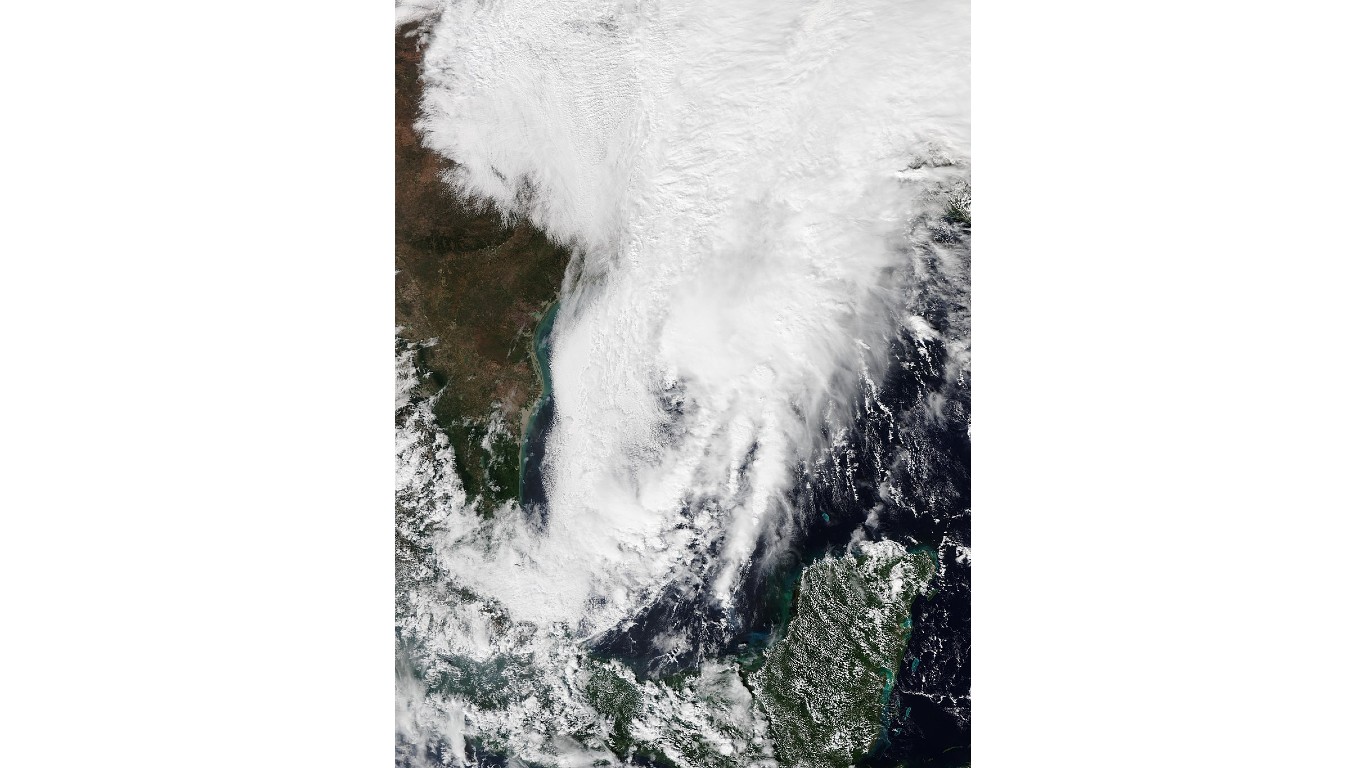
Tropical Storm Olga
> Date: Oct 25, 2019
Tropical Storm Olga hit Southeast Louisiana with wind gusts up to 70 mph, causing widespread power outages, flooding, and wind damage. Coastal flooding was also seen in Alabama and Mississippi.
[in-text-ad-2]
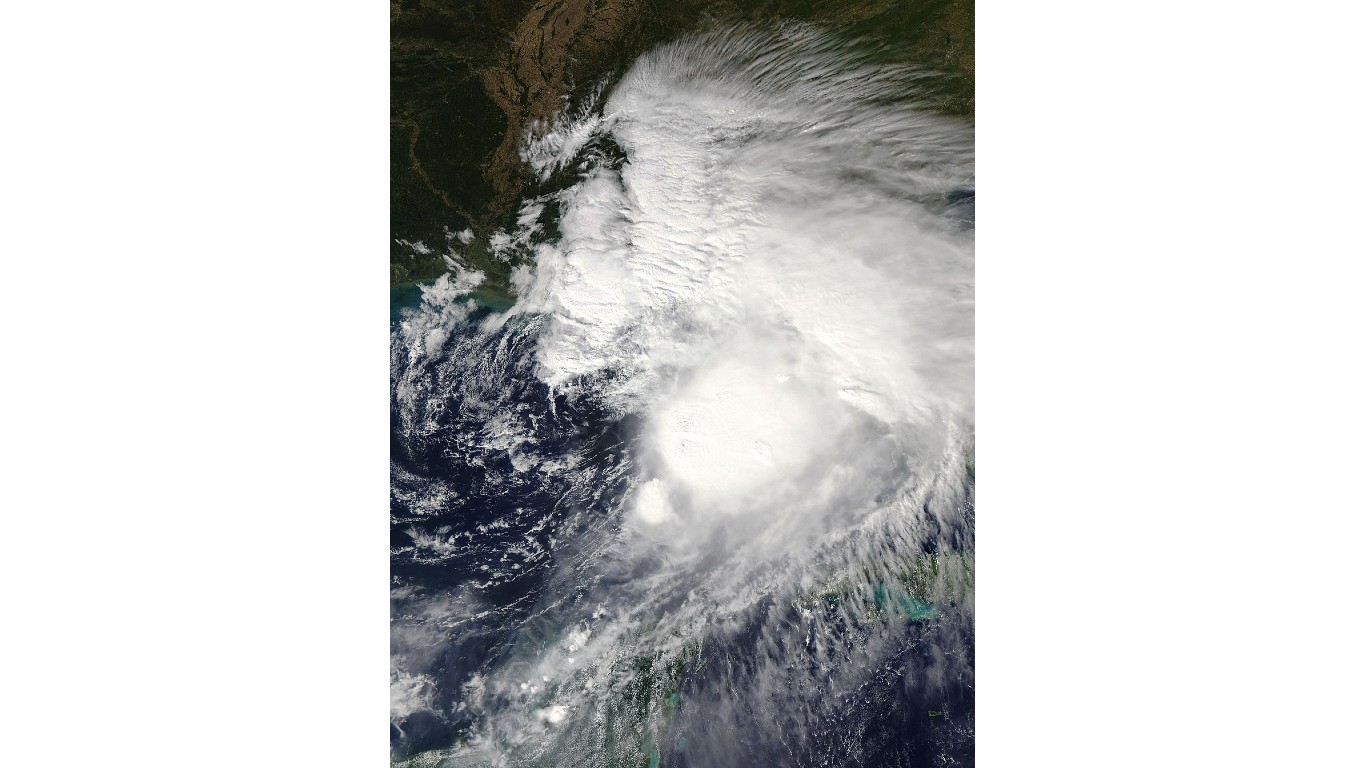
Tropical Storm Nestor
> Date: Oct 18, 2019
Tropical Storm Nestor led to a tornado outbreak in Florida that damaged homes and infrastructure in Polk County and the town of Seminole. The storm also resulted in heavy rainfall and flooding across the Florida Panhandle.
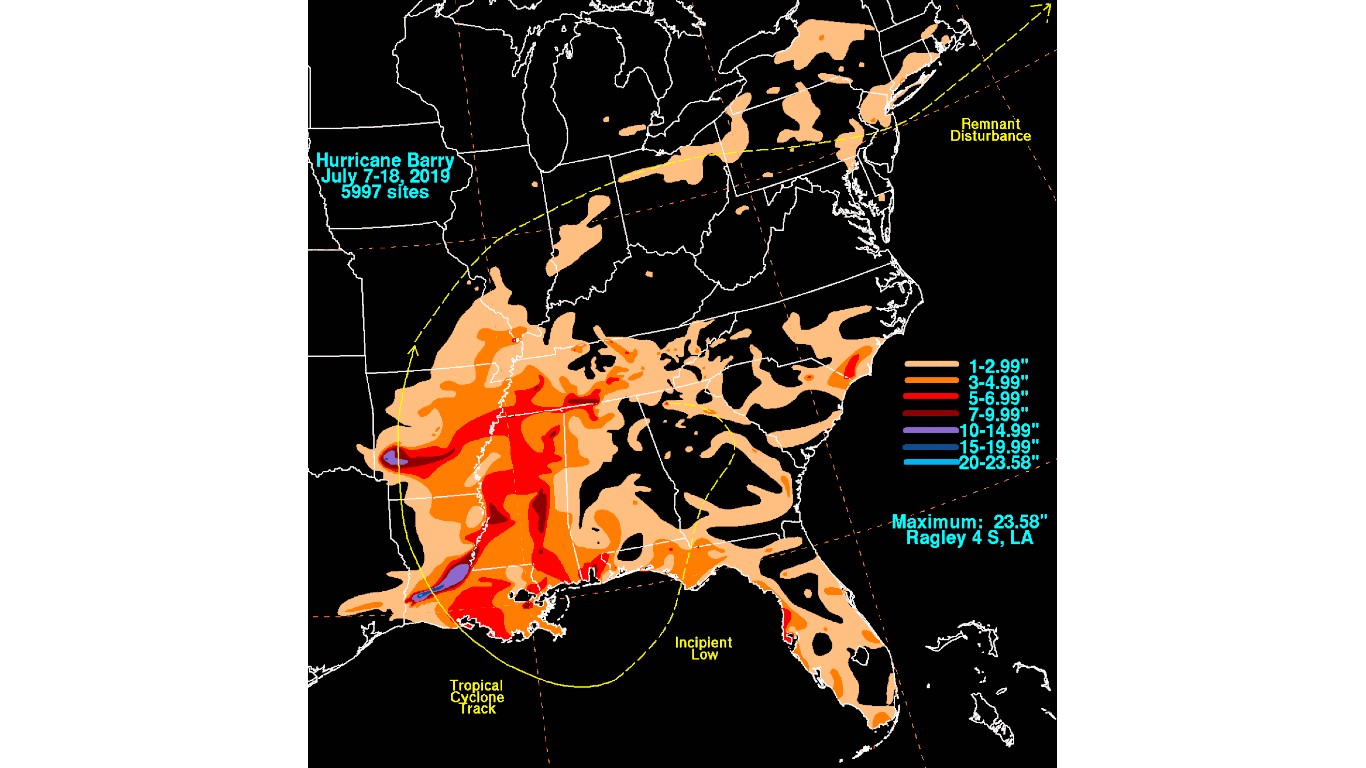
Hurricane Barry
> Date: July 13, 2019
Hurricane Barry caused significant rainfall-induced flooding in Louisiana, particularly in Baton Rouge and New Orleans. The storm led to widespread power outages and the destruction or damage of over 50,000 buildings along the Gulf Coast and Arkansas, with total damages over $600 million.
[in-text-ad]
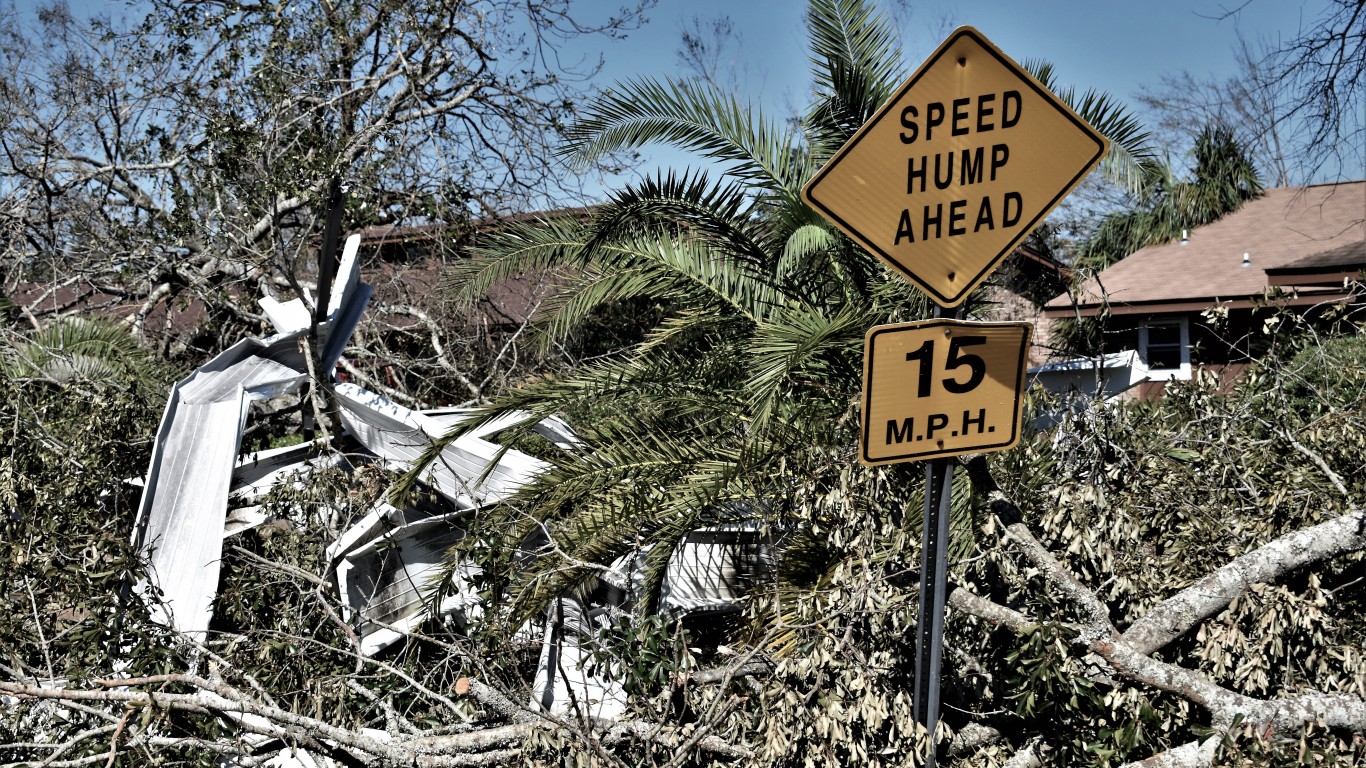
Hurricane Michael
> Date: Oct 10, 2018
The first Category 5 storm to make landfall in the U.S. since Andrew in 1992, Michael caused catastrophic damage in the Florida Panhandle, particularly Mexico Beach and Panama City, which bore the brunt with thousands of obliterated homes and businesses. Michael caused 59 deaths in the U.S. and an estimated $18 billion in damages in Florida.
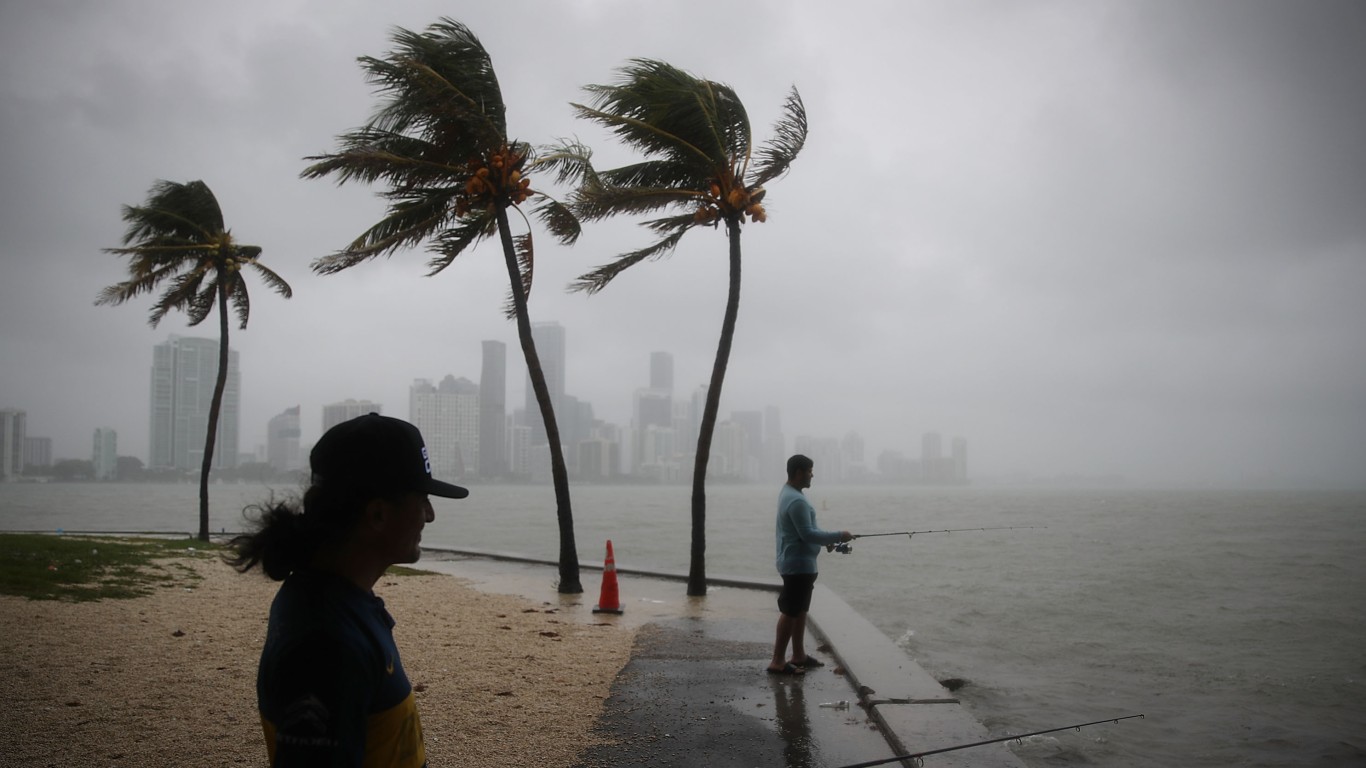
Tropical Storm Gordon
> Date: Sep 4, 2018
Tropical Storm Gordon hit Florida and Alabama with heavy rainfall and sustained winds of 70 mph, causing flash flooding and power outages. Significant damage was observed in Dauphin Island, Alabama, and Shell Beach, Mississippi.
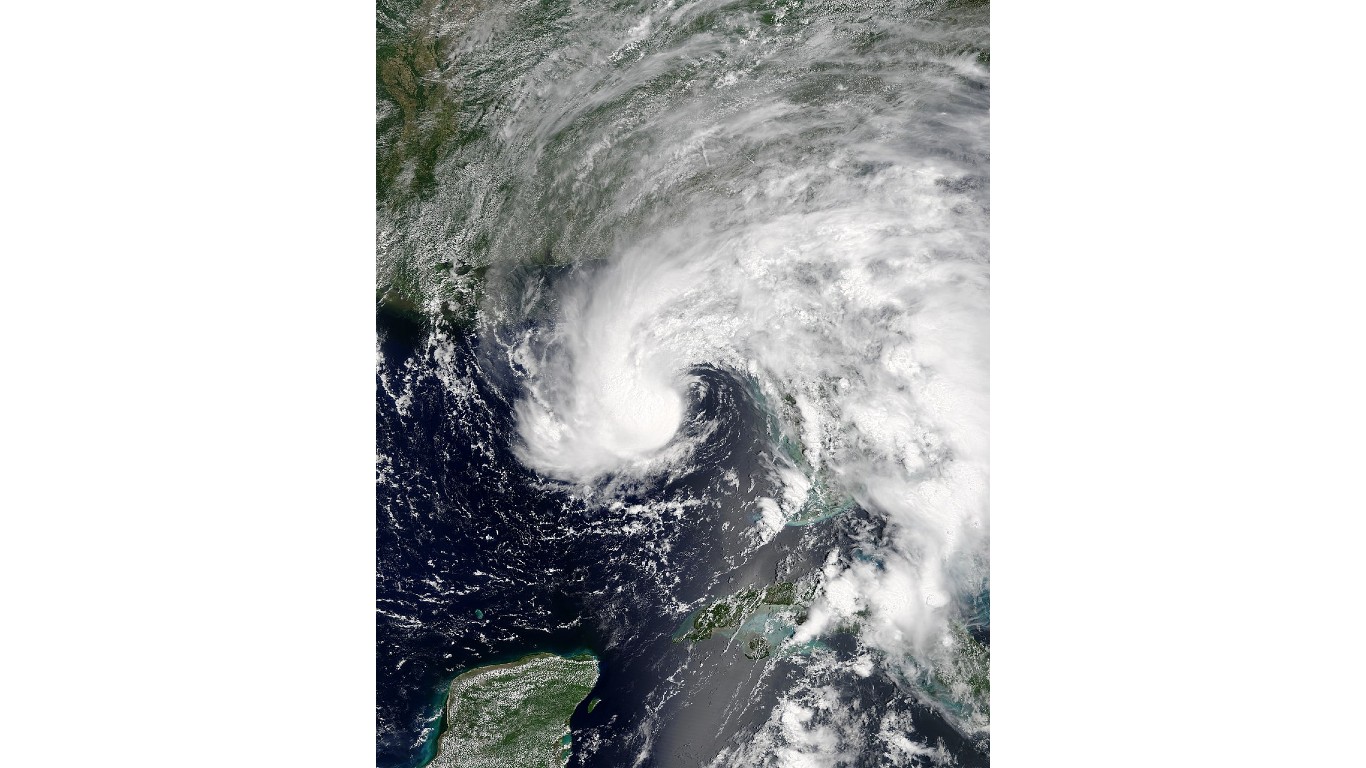
Tropical Storm Alberto
> Date: May 28, 2018
One of the earliest tropical storms to develop in the Gulf in recorded history, Tropical Storm Alberto hit the panhandle in late May, causing flooding across Florida and central Alabama before moving on to North Carolina, where landslides triggered by Alberto’s rainfall led to multiple fatalities.
[in-text-ad-2]
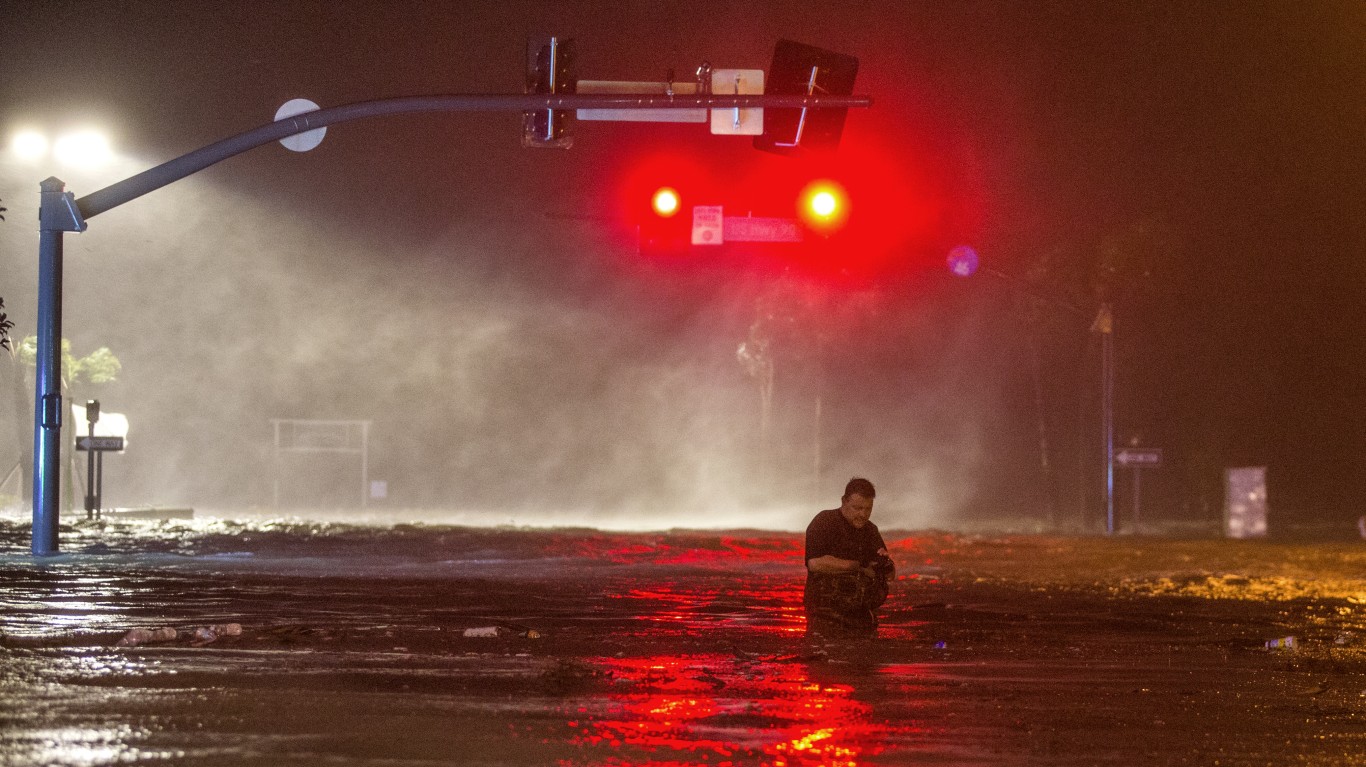
Hurricane Nate
> Date: Oct 7, 2017
Hurricane Nate ravaged Costa Rica before making landfall in the United States, notably affecting towns along the Gulf Coast. Biloxi, Mississippi, was hit particularly hard, with storm surge flooding downtown streets, while Alabama’s Dauphin Island experienced extensive beach erosion.
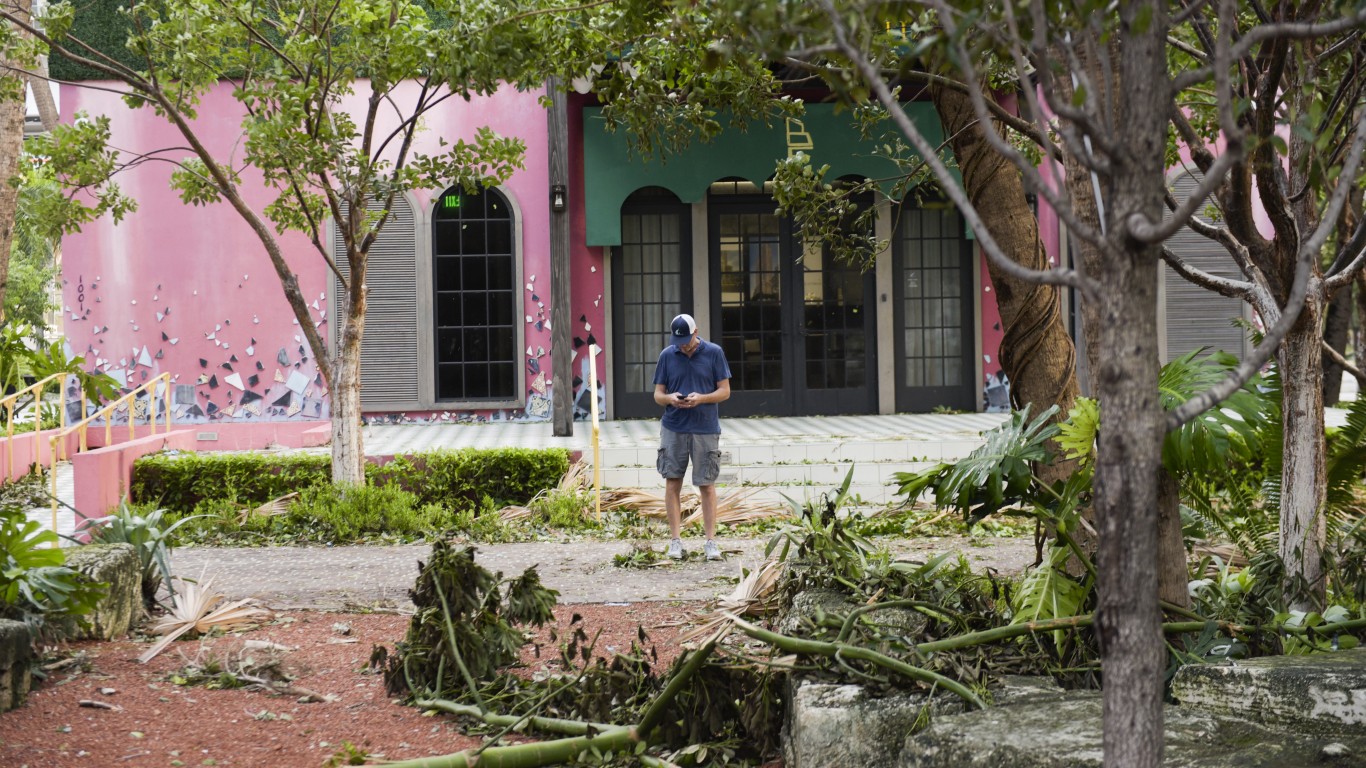
Hurricane Irma
> Date: Sep 10, 2017
Hurricane Irma, a Category 5 storm, was the most intense storm to hit the Gulf Coast since Katrina. It devastated Key West and Naples, Florida, with infrastructural damage and flooding. The hurricane caused approximately $50 billion in damages.
[in-text-ad]
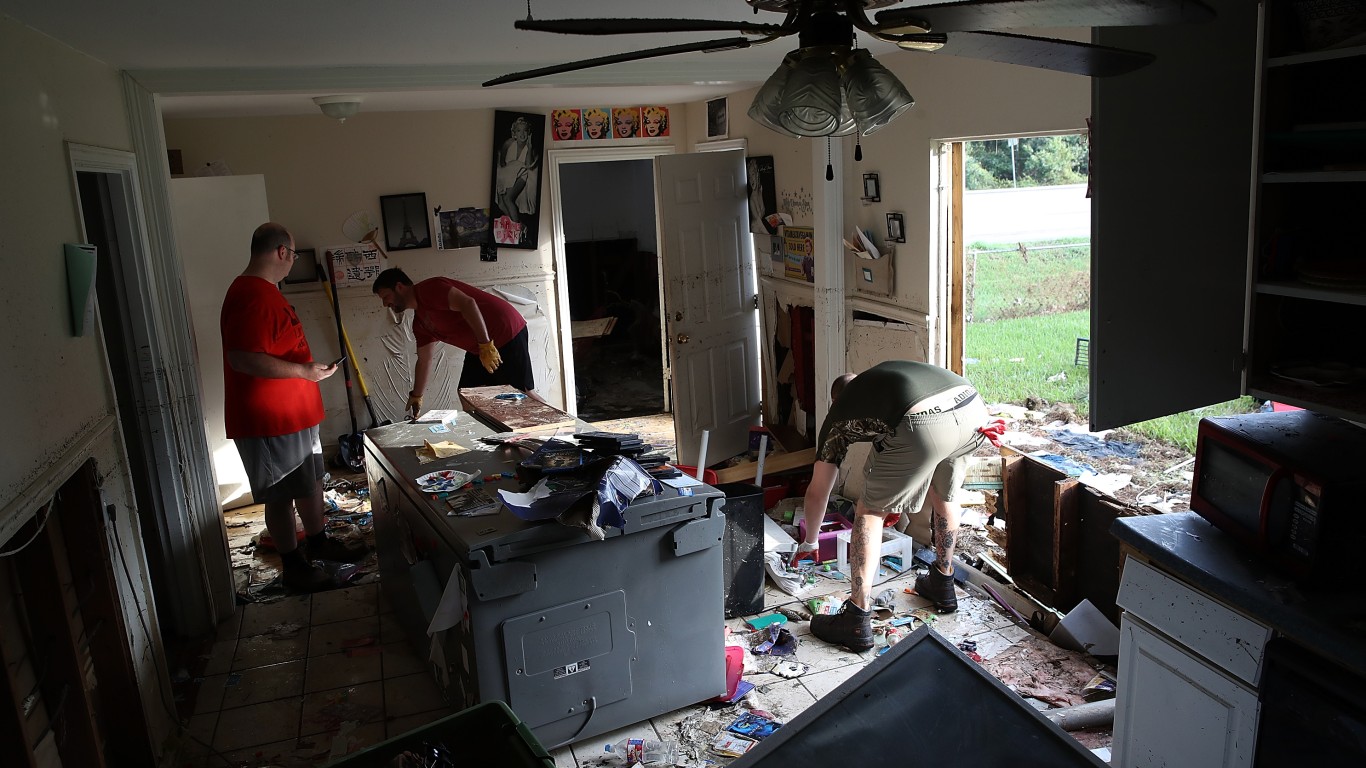
Hurricane Harvey
> Date: Aug 25, 2017
Hurricane Harvey reached Category 4 and caused widespread devastation, particularly in Texas. Rockport, Corpus Christi, and Houston experienced severe flooding and destruction. Harvey caused an estimated $125 billion in damages, making it one of the costliest natural disasters in U.S. history.
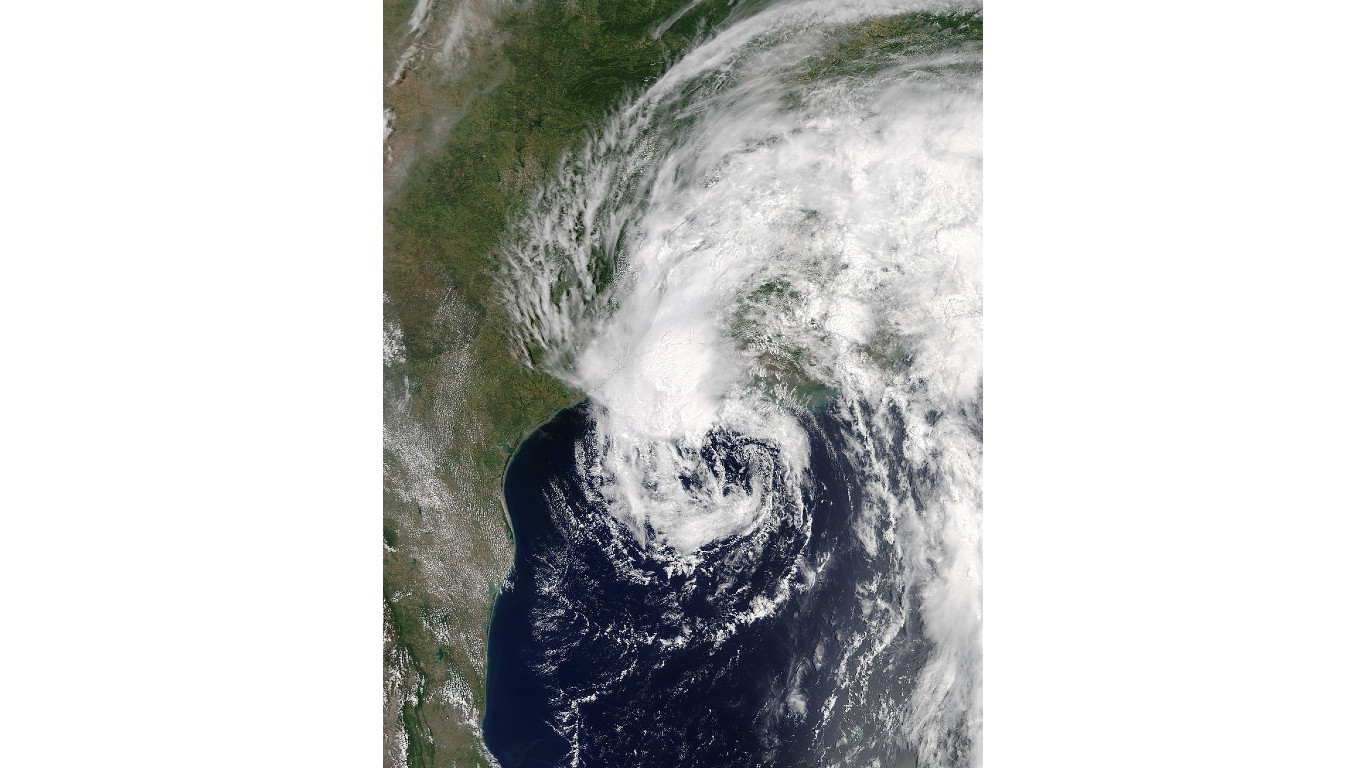
Tropical Storm Cindy
> Date: June 22, 2017
Tropical Storm Cindy caused significant flooding and damage in the Gulf Coast states, particularly in Alabama’s Baldwin County and the city of Fairfield, as well as several parishes in Louisiana, where storm surges exceeded 4 feet.
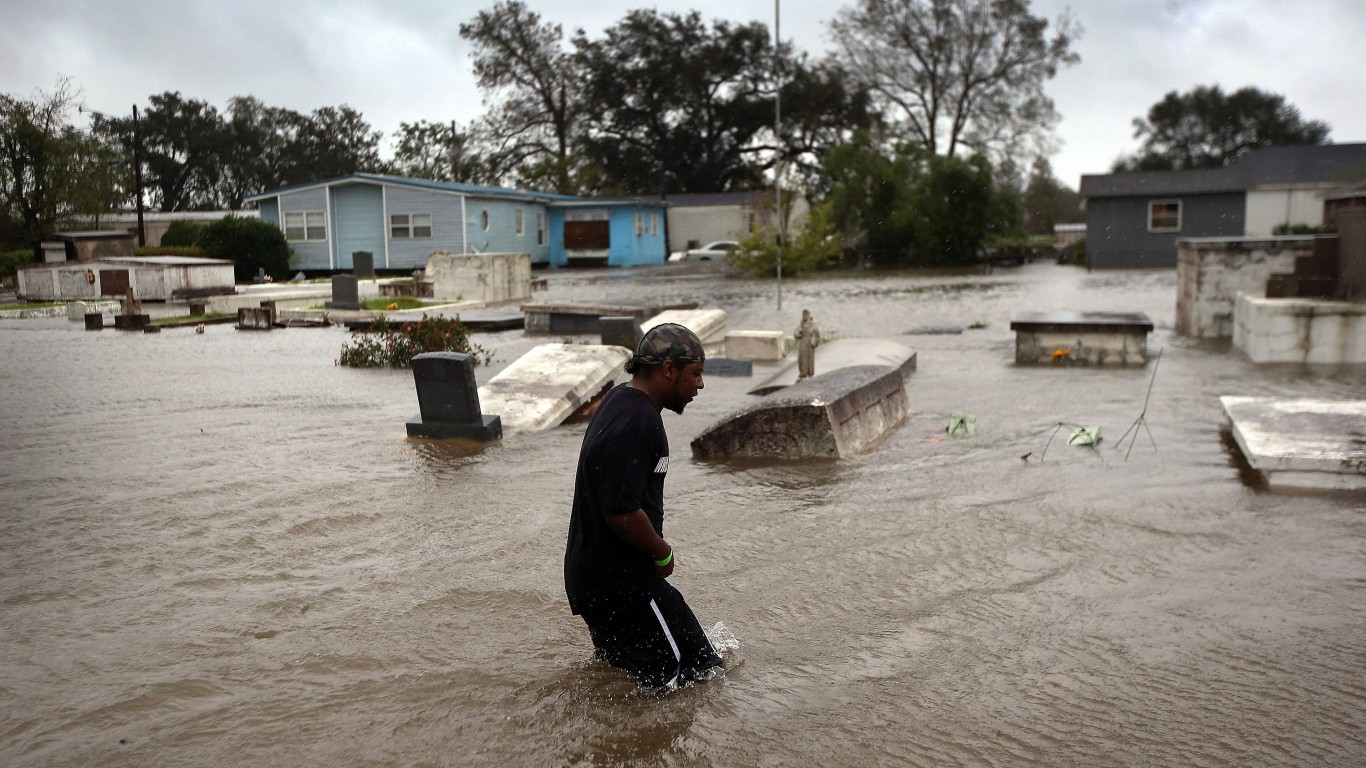
Hurricane Isaac
> Date: Aug 28, 2012
Hurricane Isaac reached sustained winds of 80 mph and hit areas including Louisiana’s Plaquemines Parish and the Mississippi coastline, where widespread flooding and power outages occurred. The storm caused an estimated $2.39 billion in damages.
[in-text-ad-2]
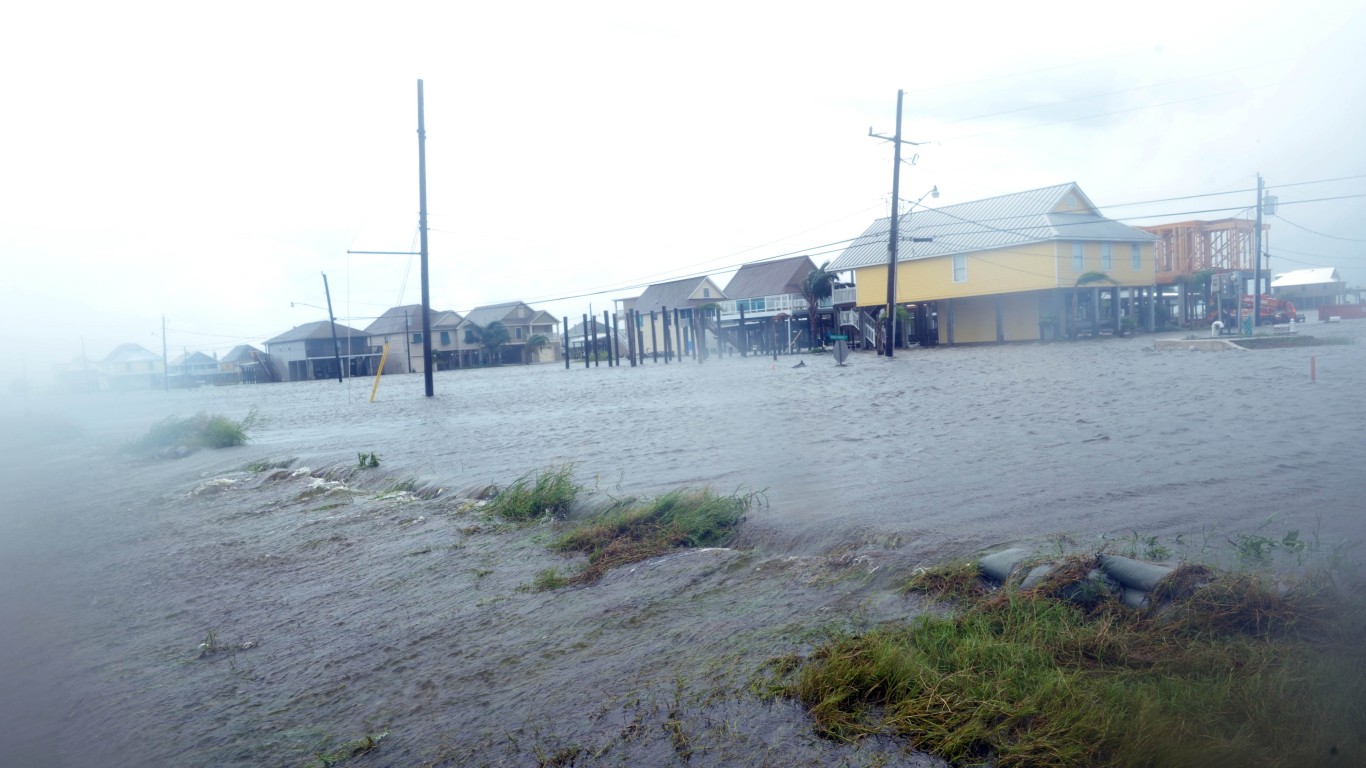
Tropical Storm Lee
> Date: Sep 4, 2011
Tropical Storm Lee, brought flooding rains to Mississippi and Louisiana, where inundation severely affected towns like Jean Lafitte and caused widespread power outages in New Orleans. It then moved on to cause massive devastation in New York and Pennsylvania.
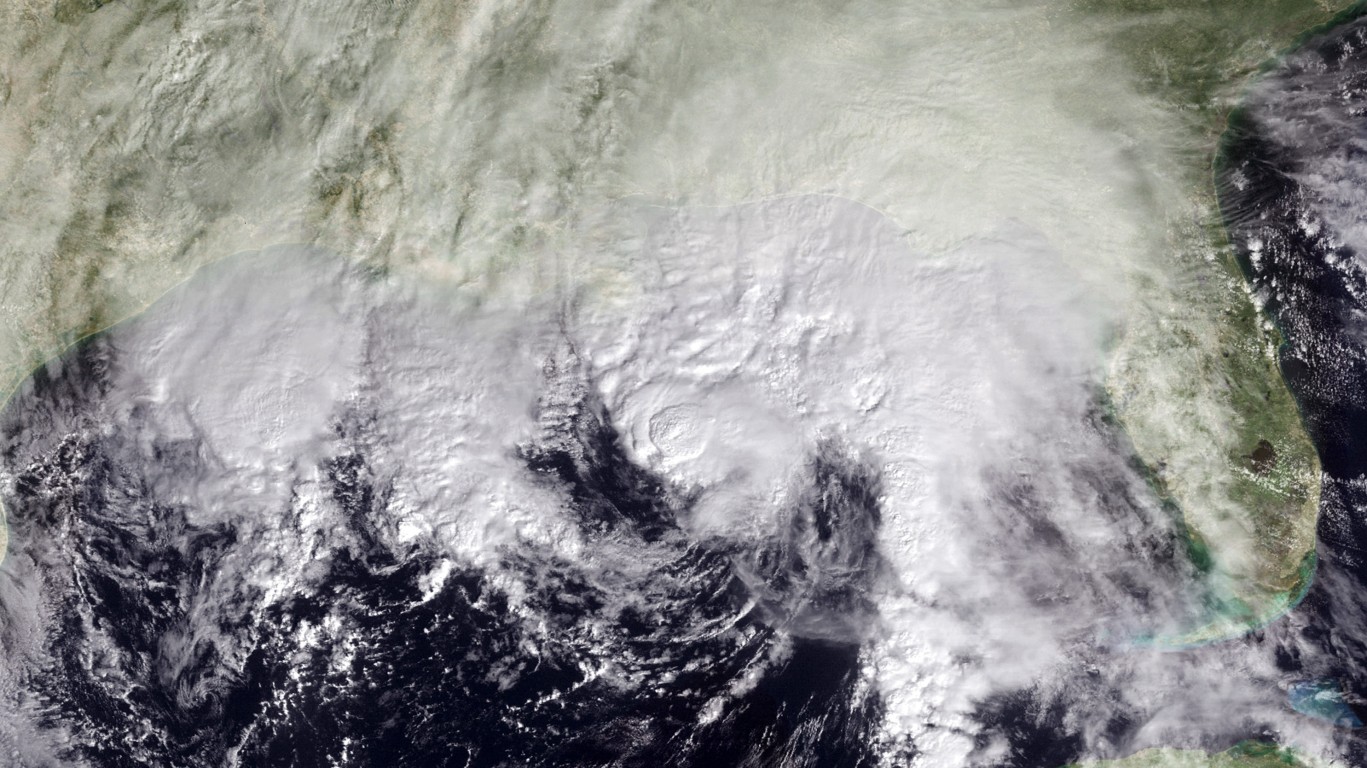
Tropical Storm Ida
> Date: Nov 10, 2009
Hurricane Ida devastated Nicaragua before making a U.S. landfall near Dauphin Island, Alabama. Winds reached 105 mph, and flash flooding and power outages were reported in several Gulf states. The storm’s remnants also caused significant damage along the mid-Atlantic coast.
[in-text-ad]
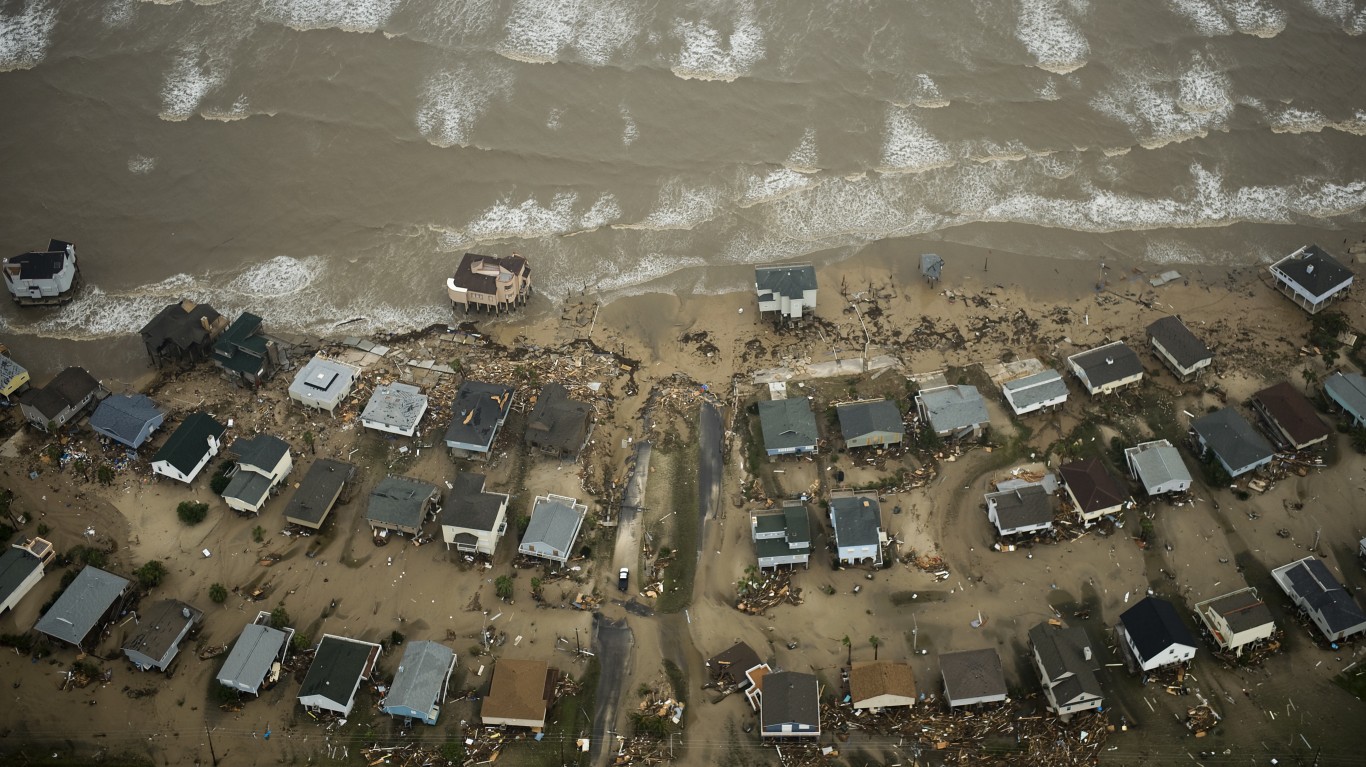
Hurricane Ike
> Date: Sep 13, 2008
After tearing through Haiti and Cuba, this Category 4 storm caused significant destruction in Louisiana and Texas, with the Bolivar Peninsula of Texas witnessing near-complete decimation and Galveston suffering extensive flooding and structural damage.
Hurricane Gustav
> Date: Sep 1, 2008
Hurricane Gustav reached Category 4, causing millions in damage in Jamaica and Cuba before hitting Louisiana, where Baton Rouge experienced widespread destruction and 34 parishes were declared federal disaster areas.
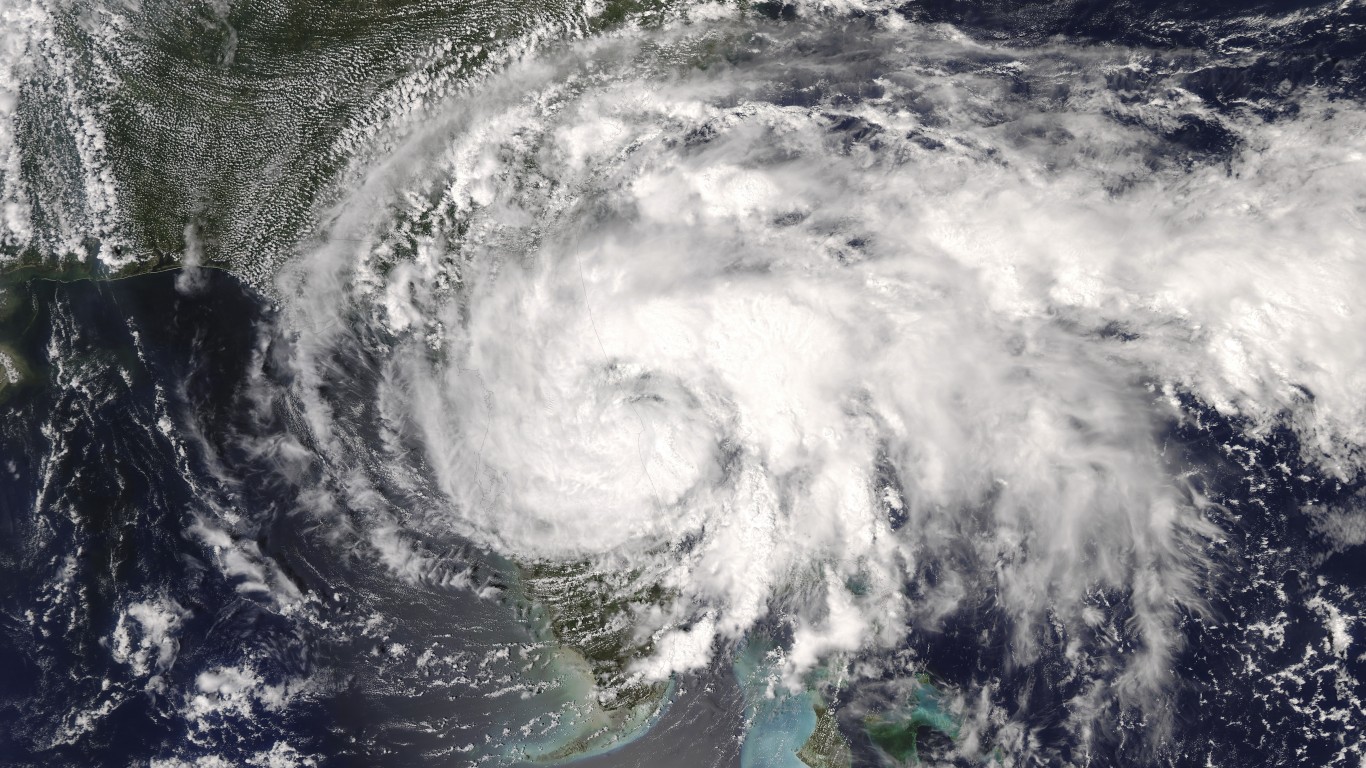
Tropical Storm Fay
> Date: Aug 18, 2008
Tropical Storm Fay made landfall four separate times in Florida and is noteworthy for its extremely heavy rainfall that caused significant flooding and damage across Florida and other parts of the southeastern United States.
[in-text-ad-2]
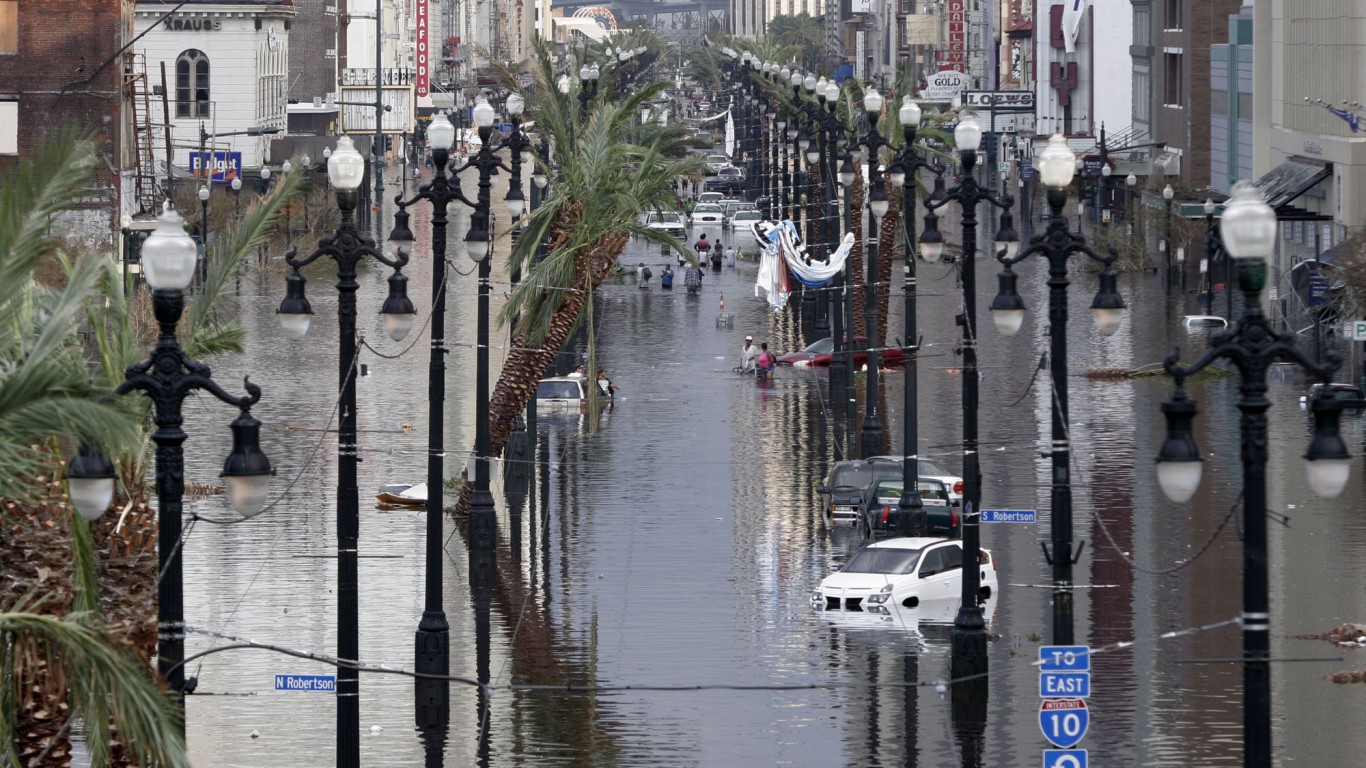
Hurricane Katrina
> Date: Aug 29, 2005
Hurricane Katrina devastated the U.S. Gulf Coast in 2005. New Orleans bore the brunt, with levees failing and causing extensive flooding. Katrina was one of the deadliest hurricanes in U.S. history, with over 1,800 fatalities, as well as one of the costliest, with damages estimated at $161 billion.
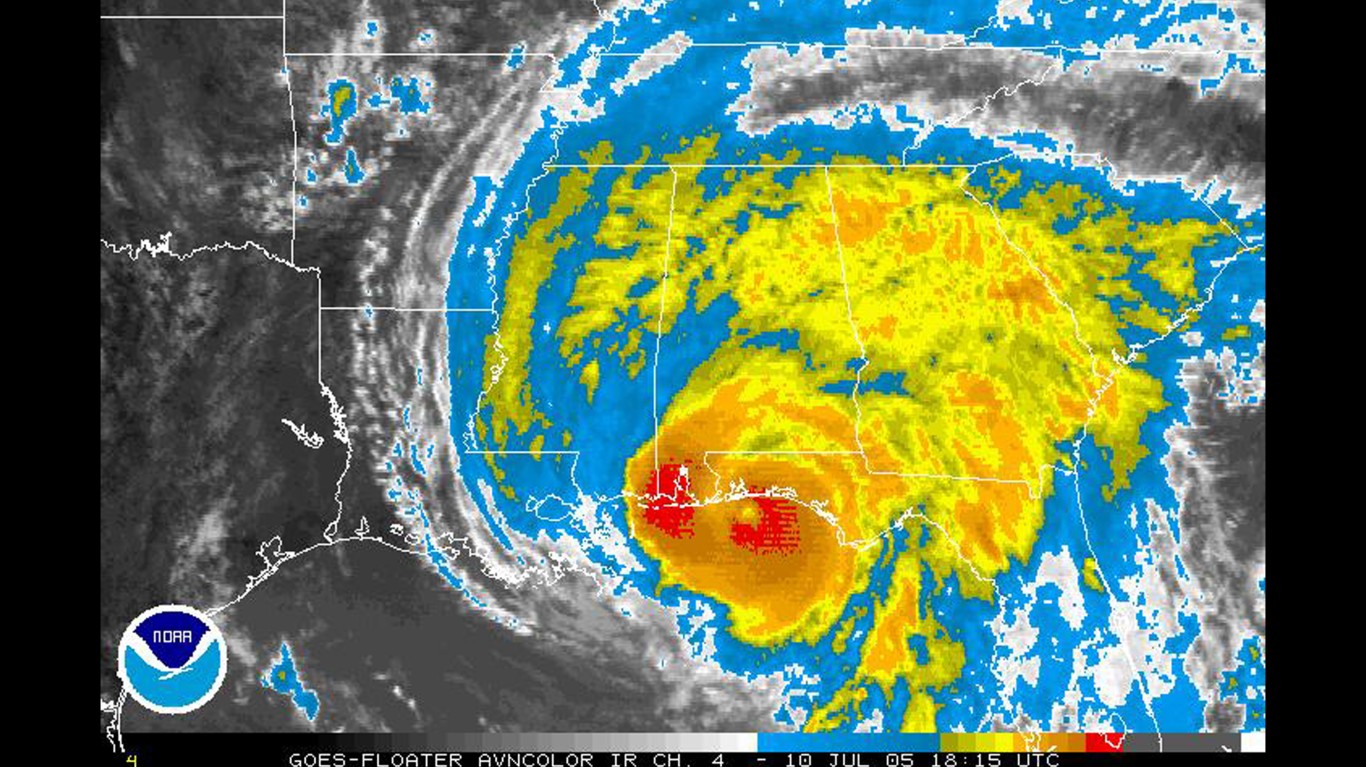
Hurricane Dennis
> Date: July 10, 2005
Hurricane Dennis devastated Cuba and was downgraded from a Category 4 storm to Category 3 before hitting Florida and Alabama. Santa Rosa and Escambia Counties in Florida experienced severe damage, with total U.S. losses estimated at $2.5 billion.
[in-text-ad]
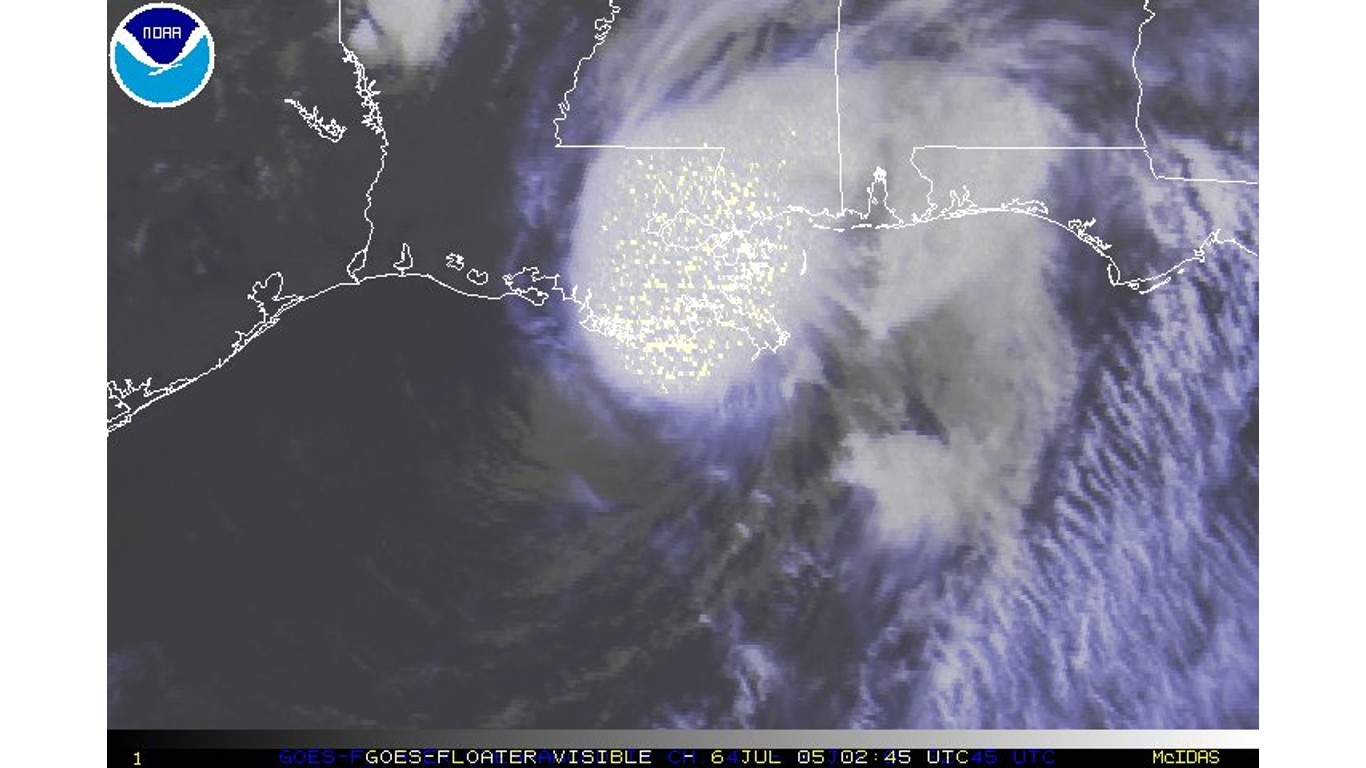
Hurricane Cindy
> Date: July 7, 2005
Hurricane Cindy caused significant damage in several states. In Louisiana, it caused beach erosion, infrastructure damage, and a severe blackout. Cindy also caused a widespread tornado outbreak across the southeast, which led to further damage.
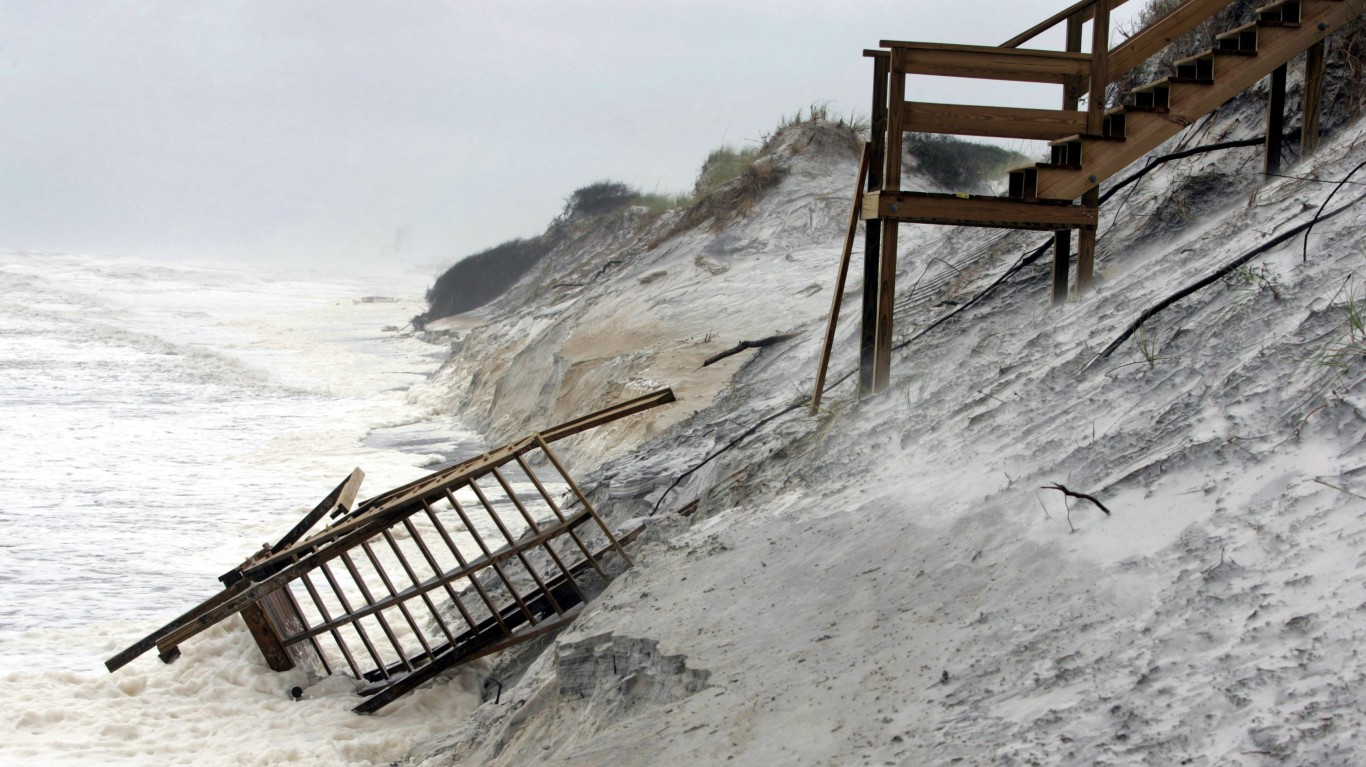
Tropical Storm Arlene
> Date: June 11, 2005
Tropical Storm Arlene mainly affected Florida, causing beach erosion, flooding, and minor damage in towns such as Pensacola Beach, with estimated total damages around $11.8 million.
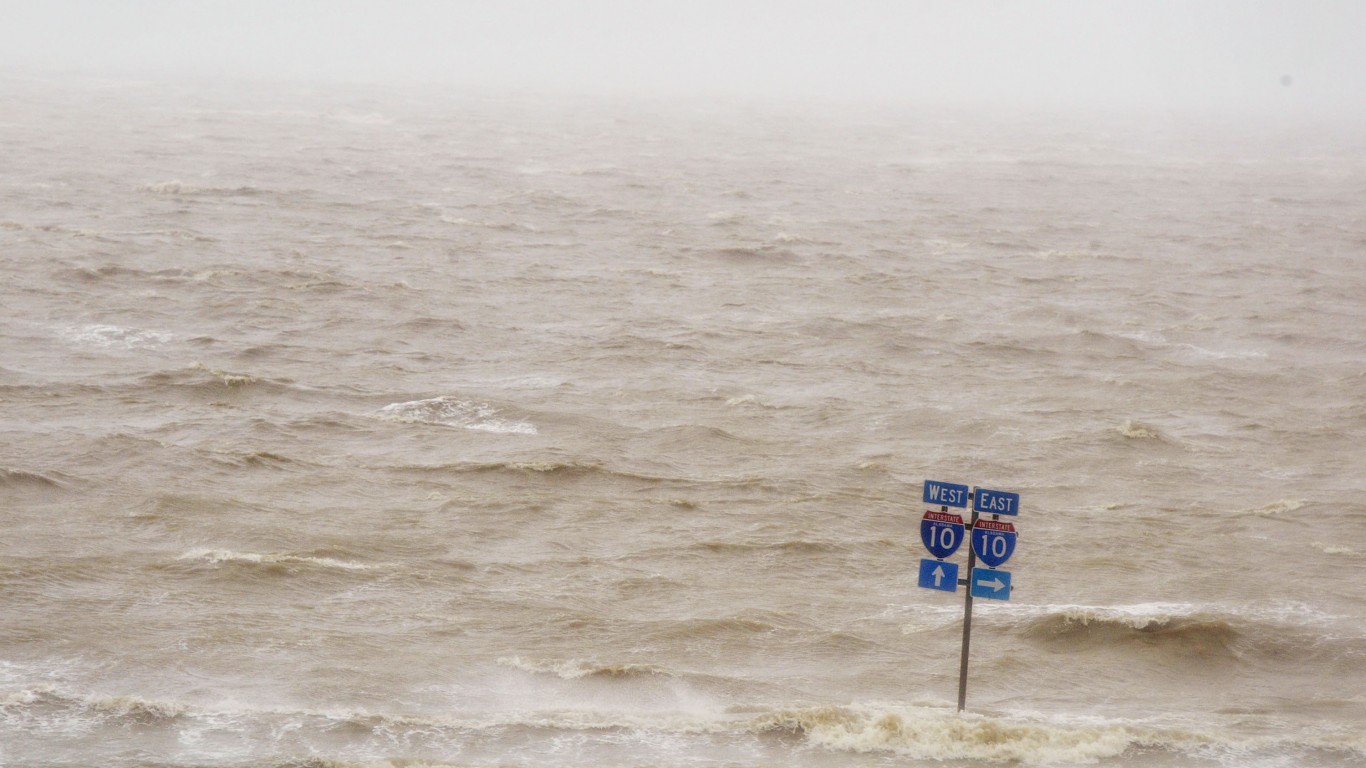
Hurricane Ivan
> Date: Sep 16, 2004
Hurricane Ivan, which reached Category 5 at its peak, devastated the Gulf Coast and caused over $14 billion in damage. In Alabama, the town of Gulf Shores saw significant damage, with much of the community destroyed. Pensacola Beach, Florida, also suffered extensive destruction, with numerous buildings leveled.
[in-text-ad-2]
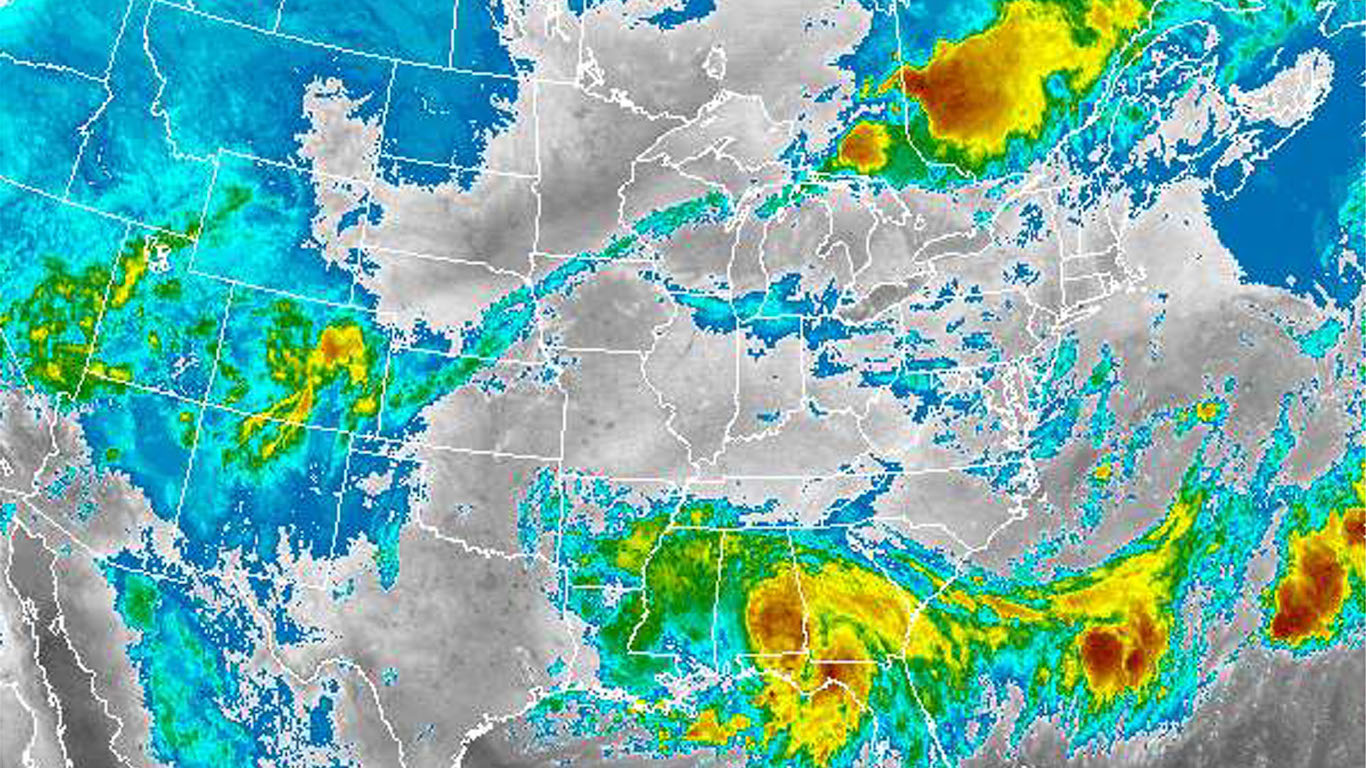
Tropical Storm Barry
> Date: Aug 6, 2001
Tropical Storm Barry led to moderate flooding in southern Florida and the Panhandle. Southern Alabama also experienced widespread flooding, power outages, and some structural damage.
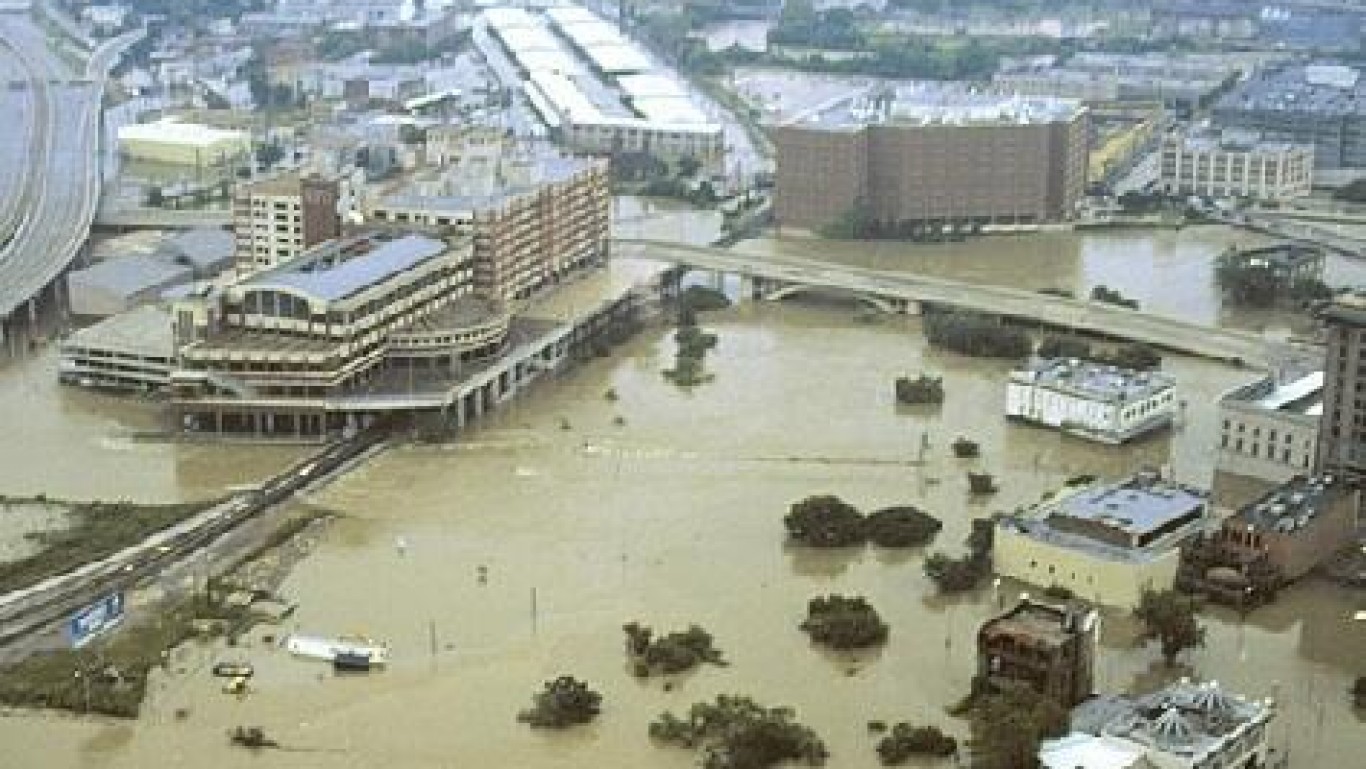
Tropical Storm Allison
> Date: June 5, 2001
Tropical Storm Allison lingered over Texas for four days, dropping over 40 inches of rain and causing widespread flooding that led to 23 deaths and about $5 billion in damages. Louisiana, Mississippi, Alabama, and Florida also experienced flooding and destruction.
[in-text-ad]
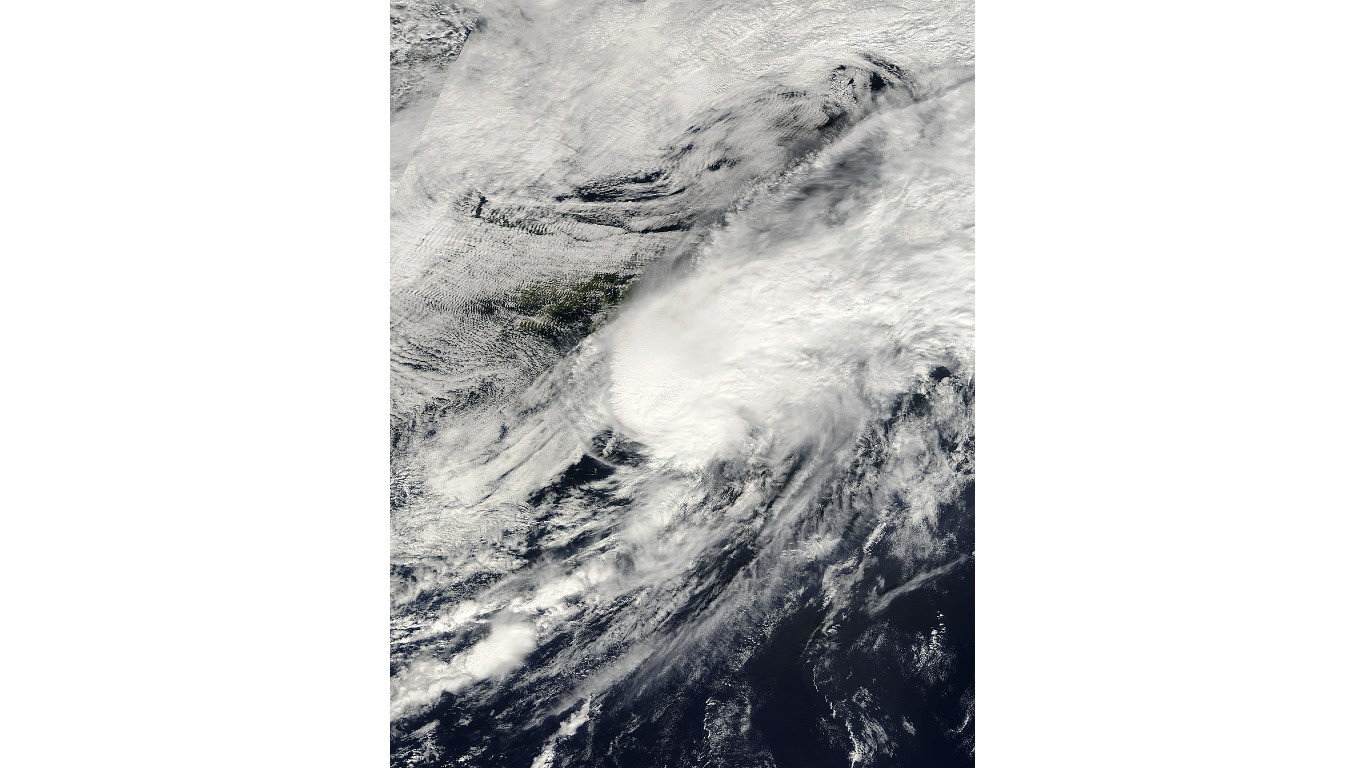
Tropical Storm Helene
> Date: Sep 22, 2000
Tropical Storm Helene caused significant rains that flooded over 100 homes in the Florida Panhandle and left 5,000 people without power. Helene also spawned six tornadoes in the area.
The Average American Is Losing Momentum On Their Savings Every Day (Sponsor)
If you’re like many Americans and keep your money ‘safe’ in a checking or savings account, think again. The average yield on a savings account is a paltry .4%1 today. Checking accounts are even worse.
But there is good news. To win qualified customers, some accounts are paying more than 7x the national average. That’s an incredible way to keep your money safe and earn more at the same time. Our top pick for high yield savings accounts includes other benefits as well. You can earn a $200 bonus and up to 7X the national average with qualifying deposits. Terms apply. Member, FDIC.
Click here to see how much more you could be earning on your savings today. It takes just a few minutes to open an account to make your money work for you.
Thank you for reading! Have some feedback for us?
Contact the 24/7 Wall St. editorial team.